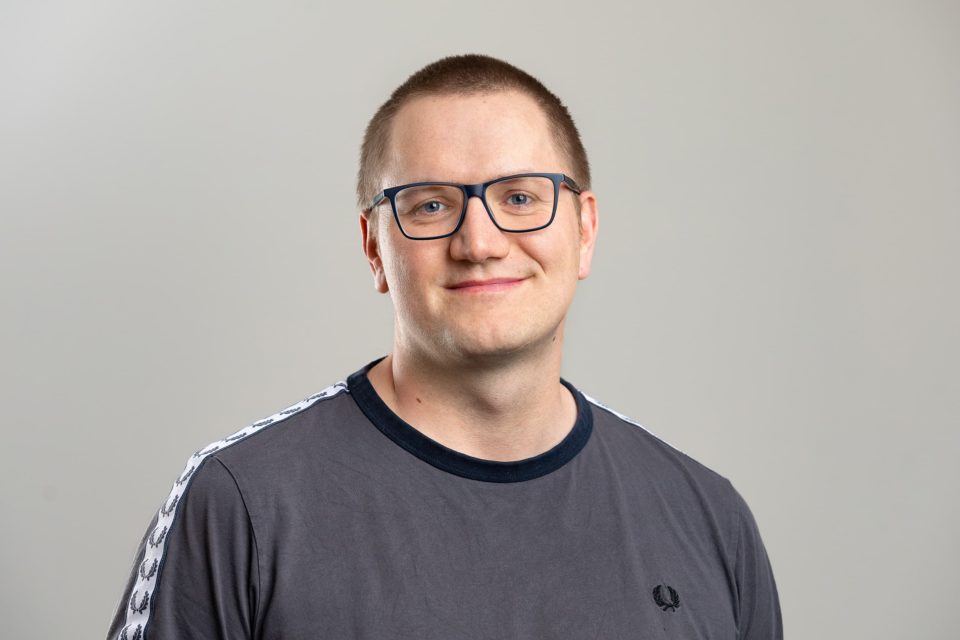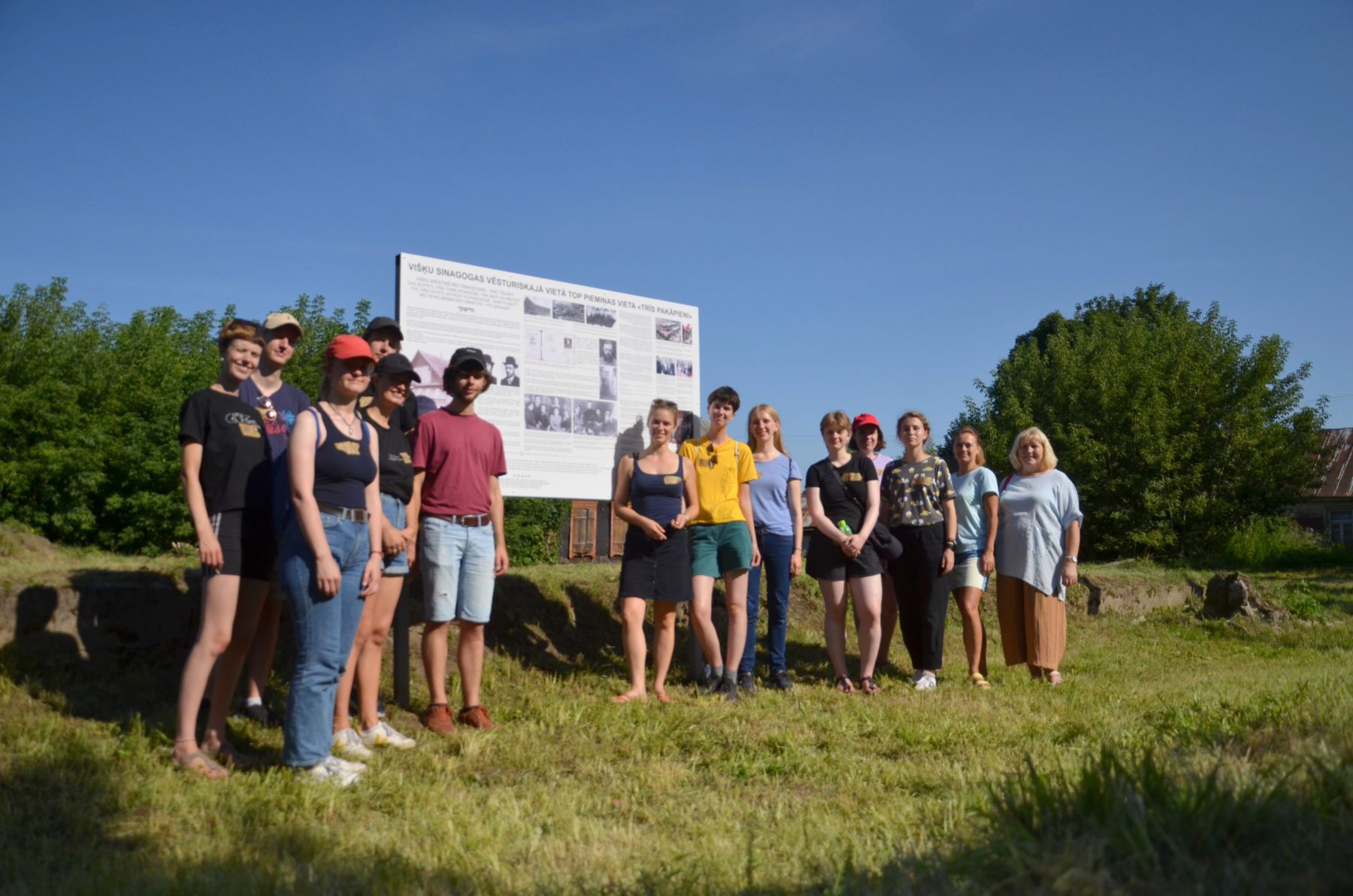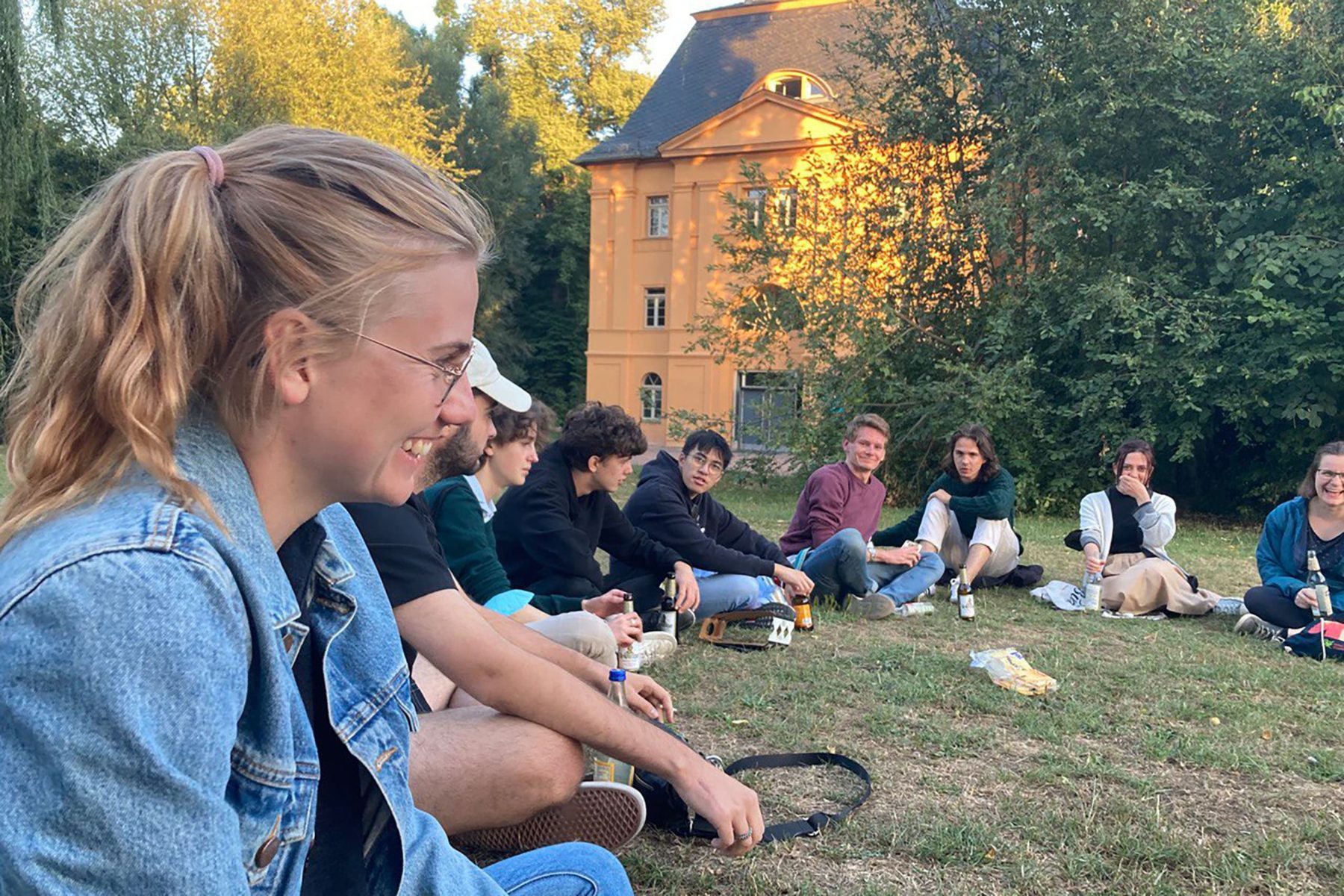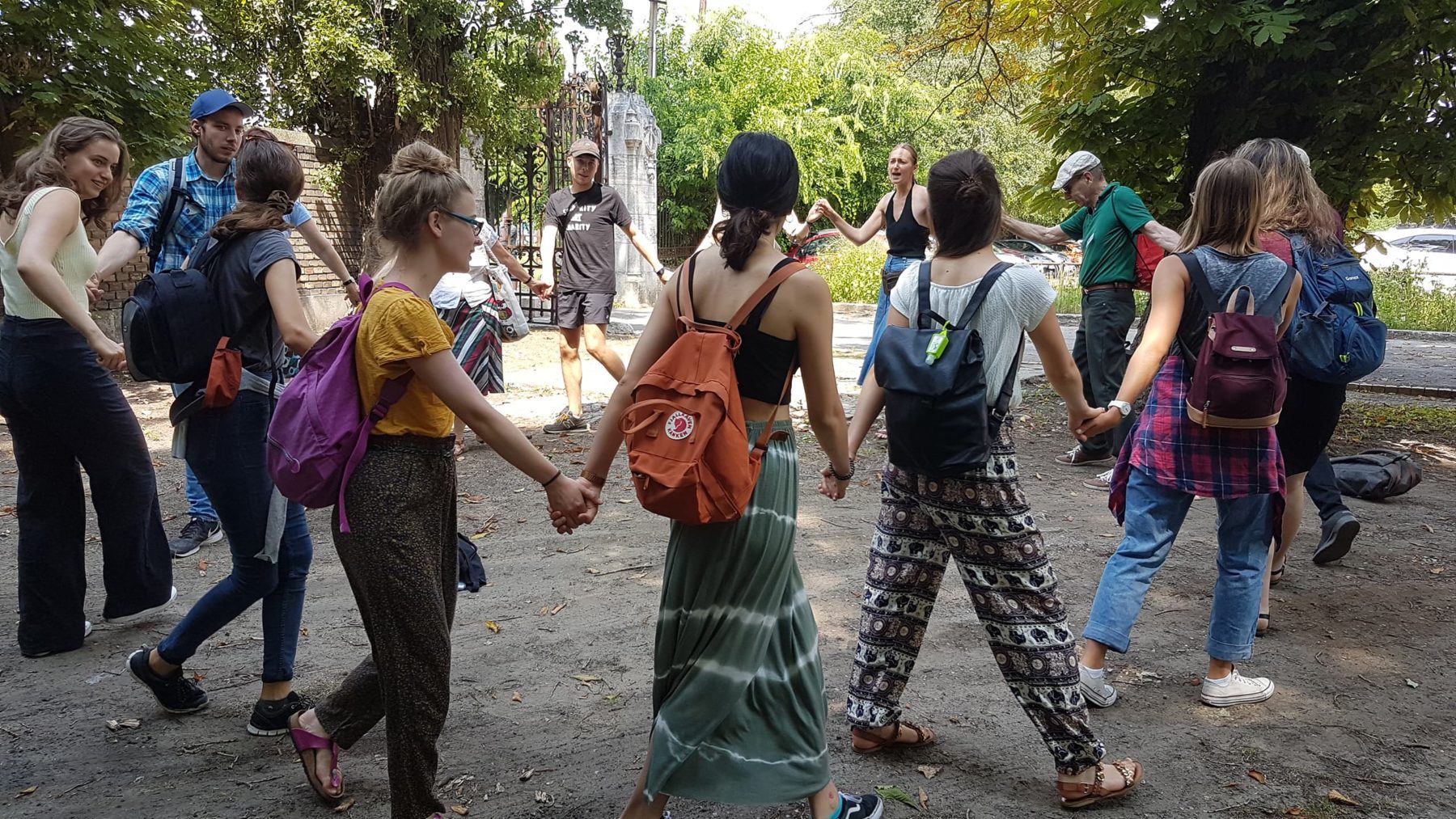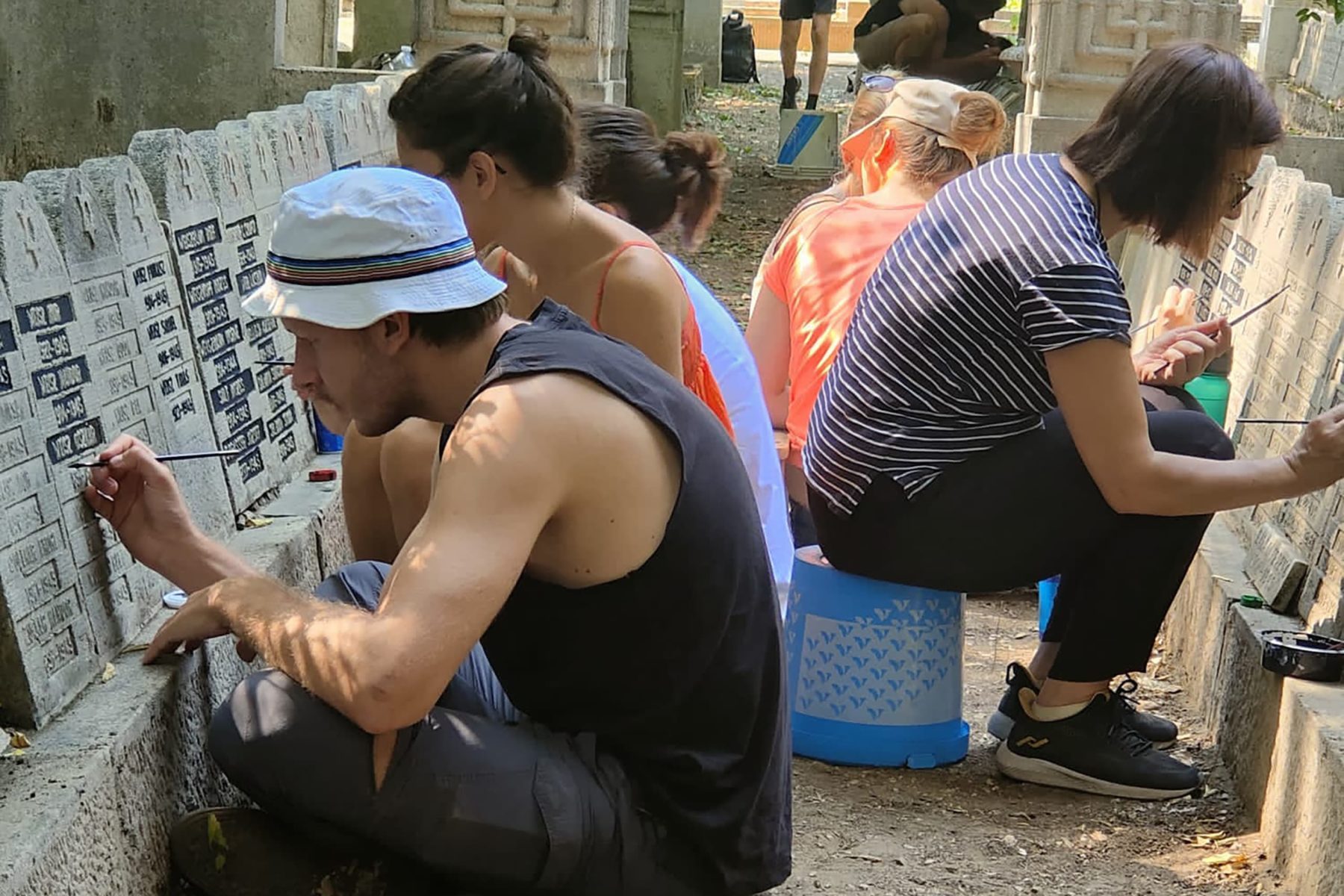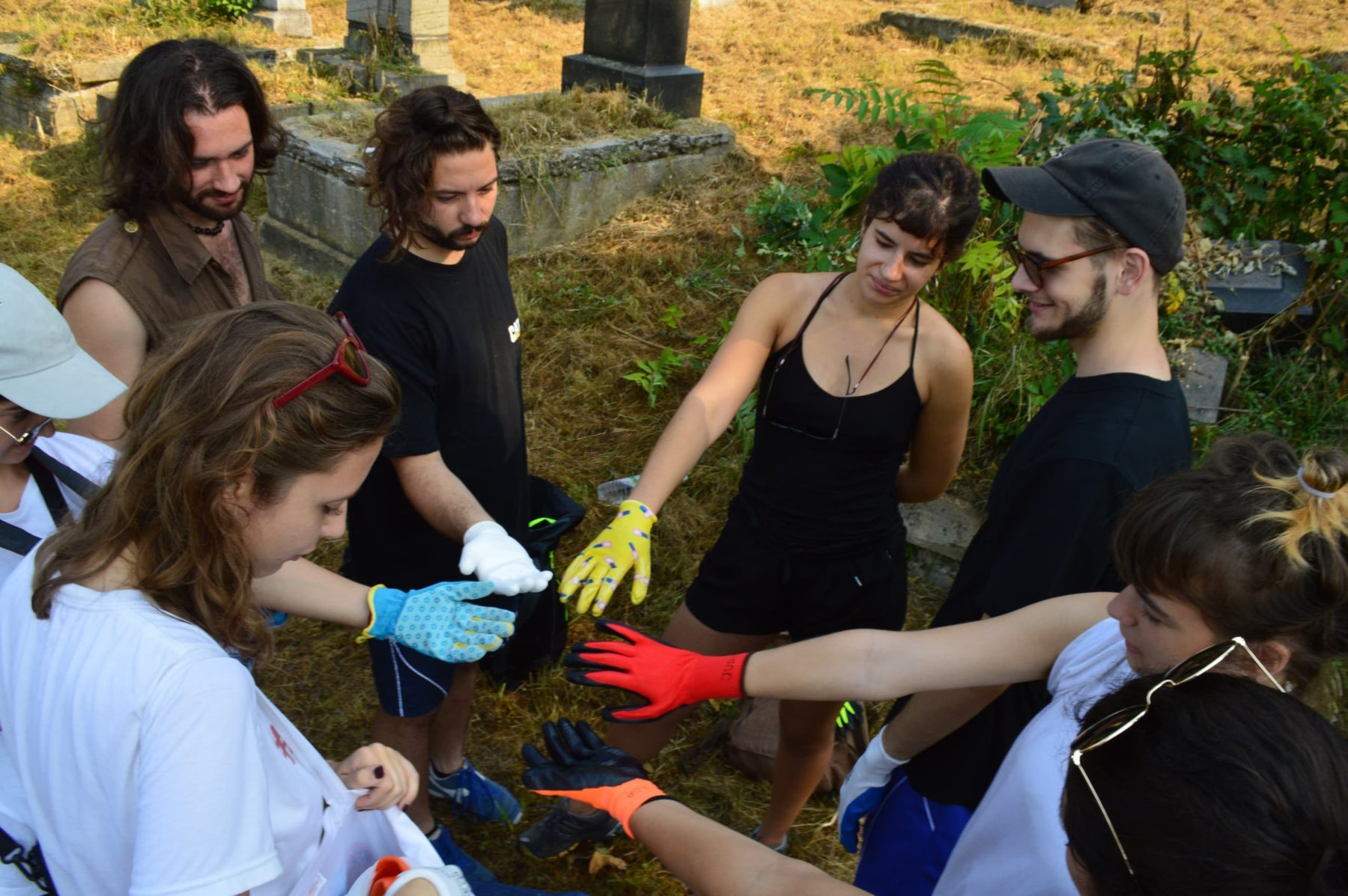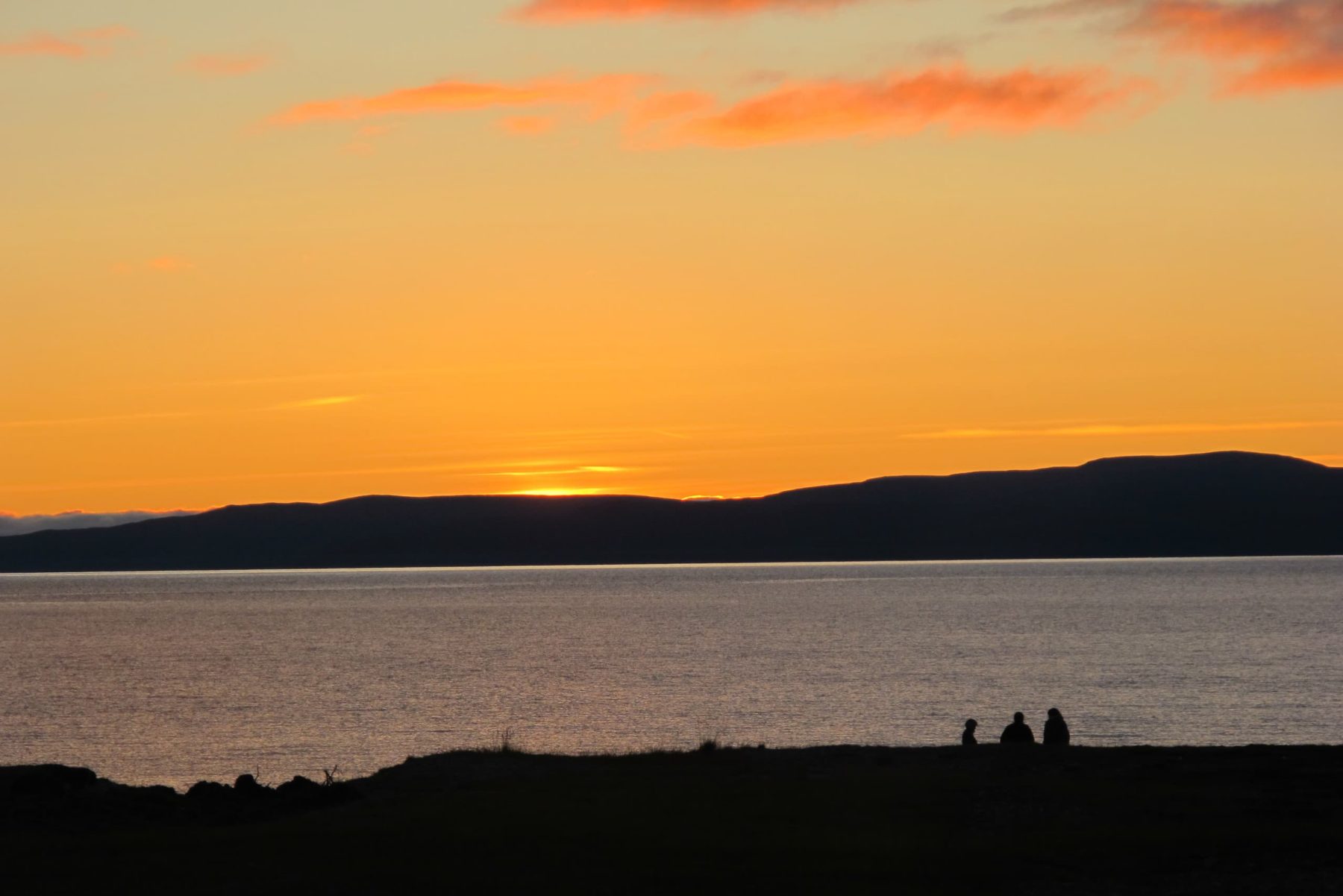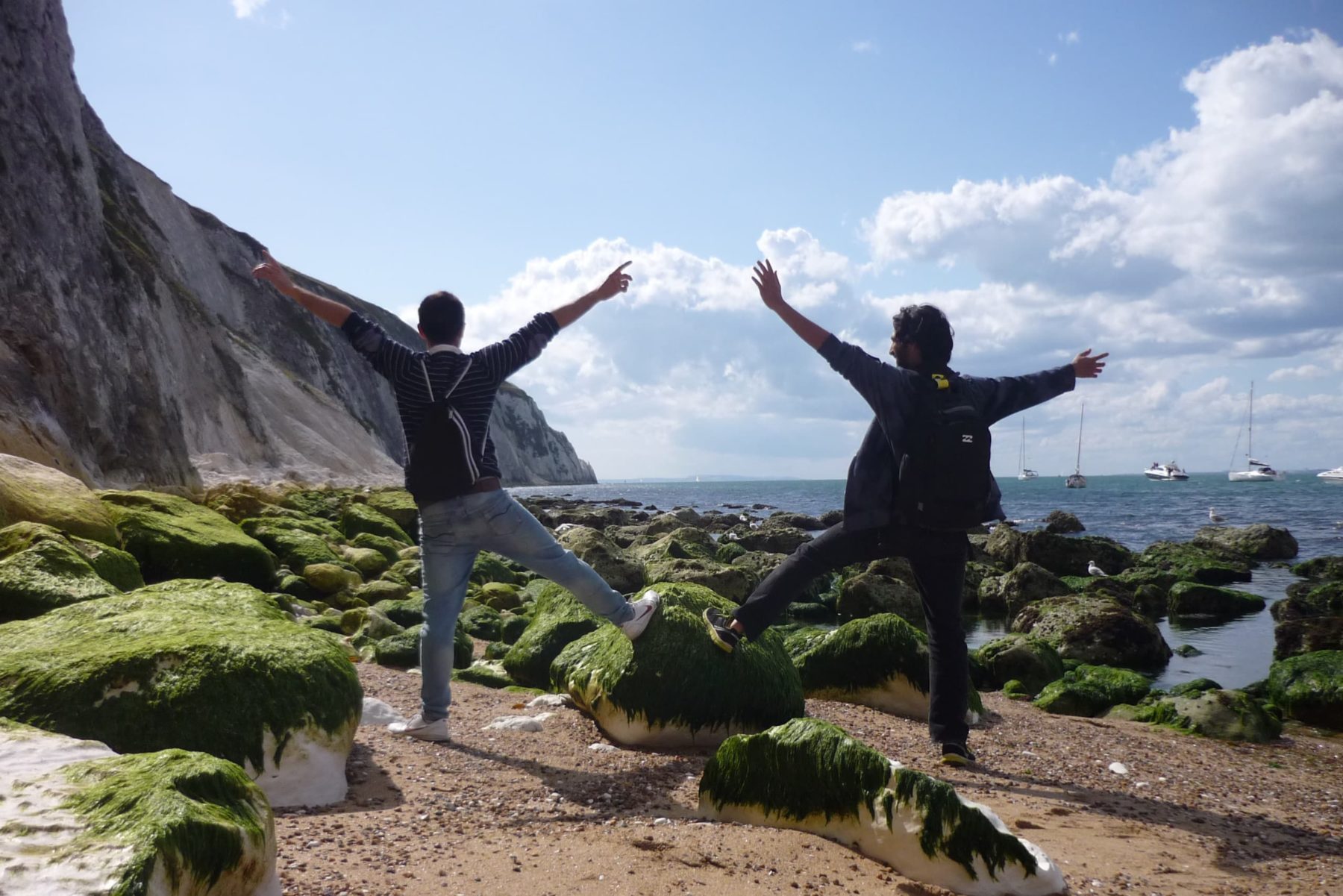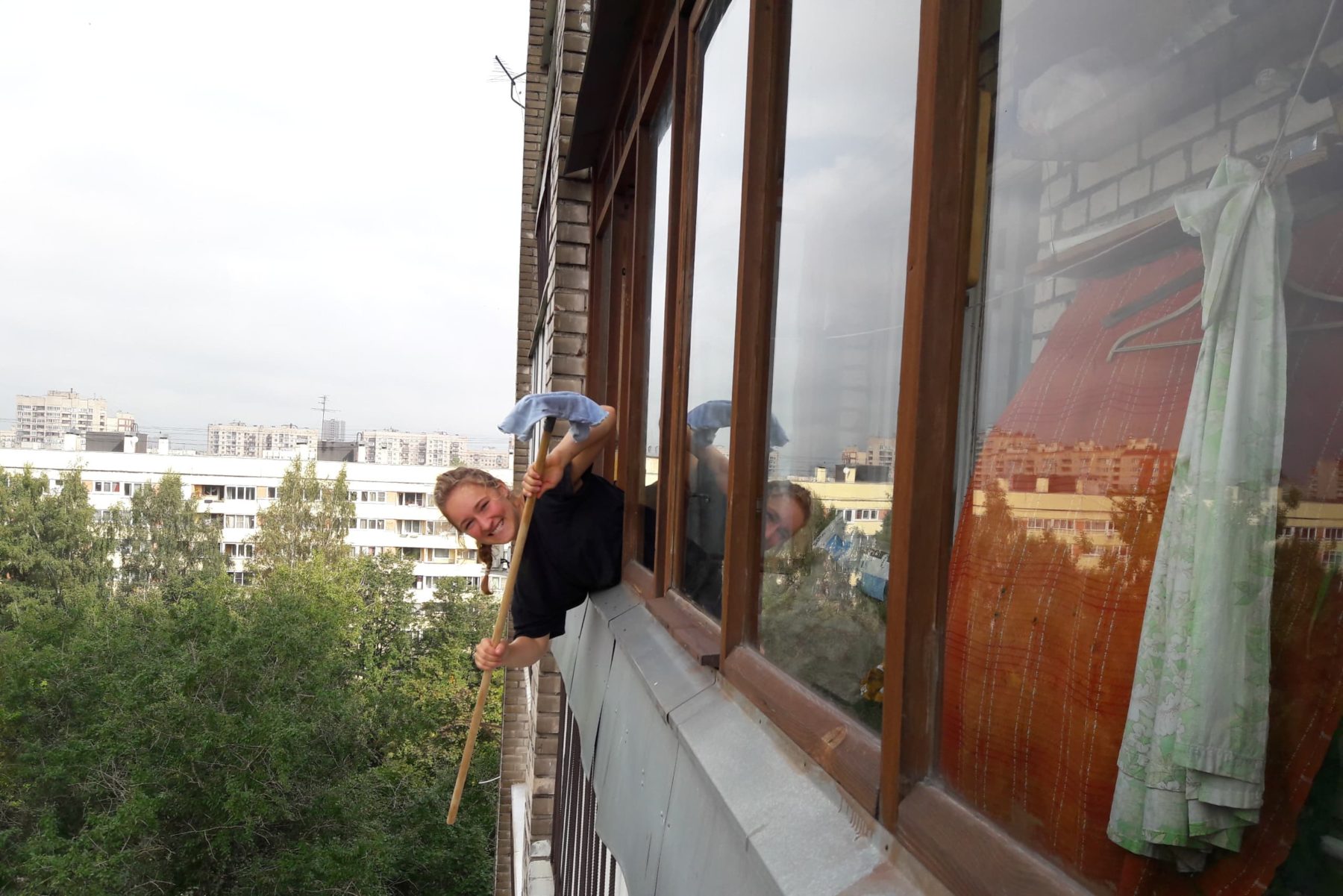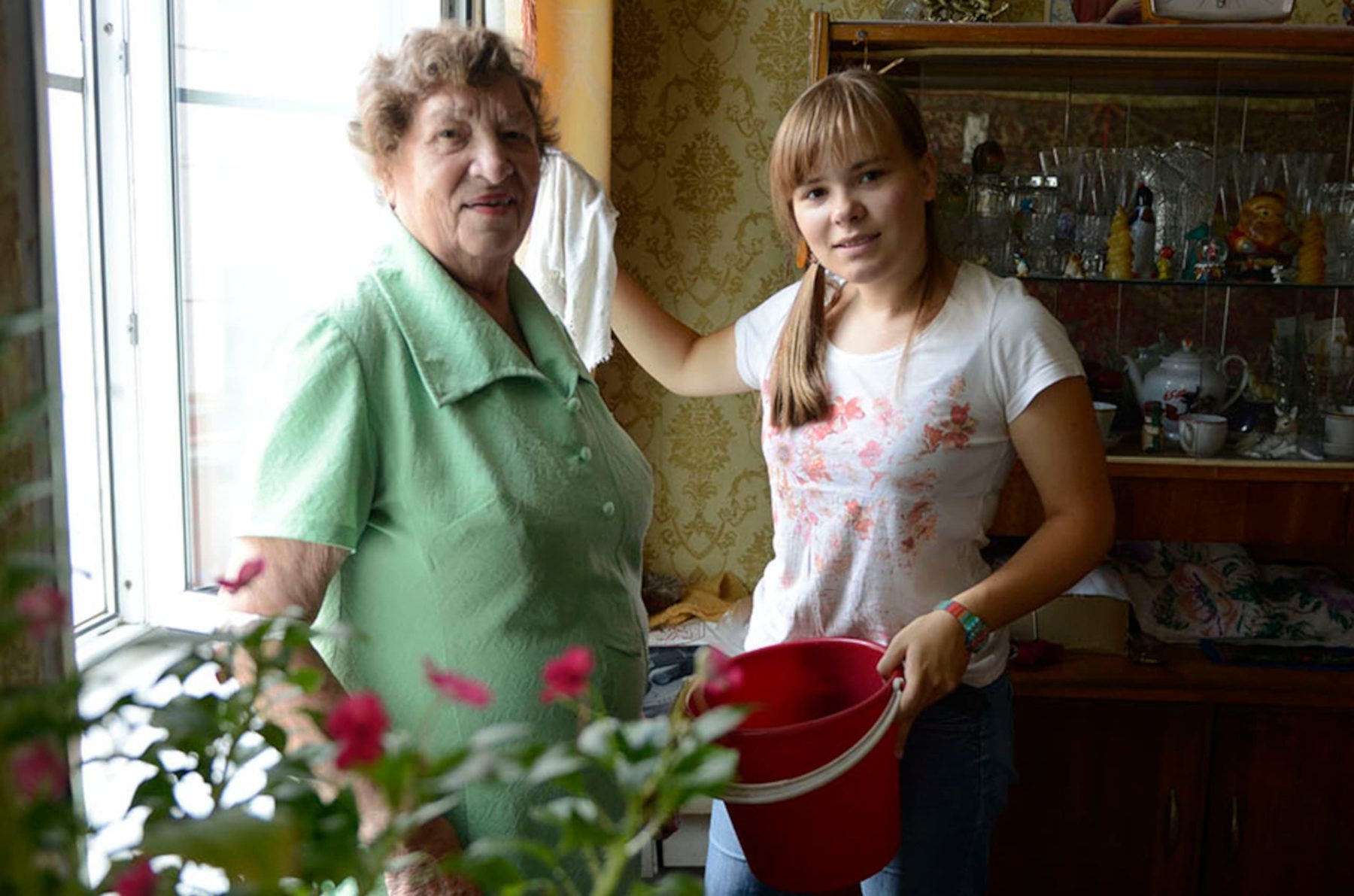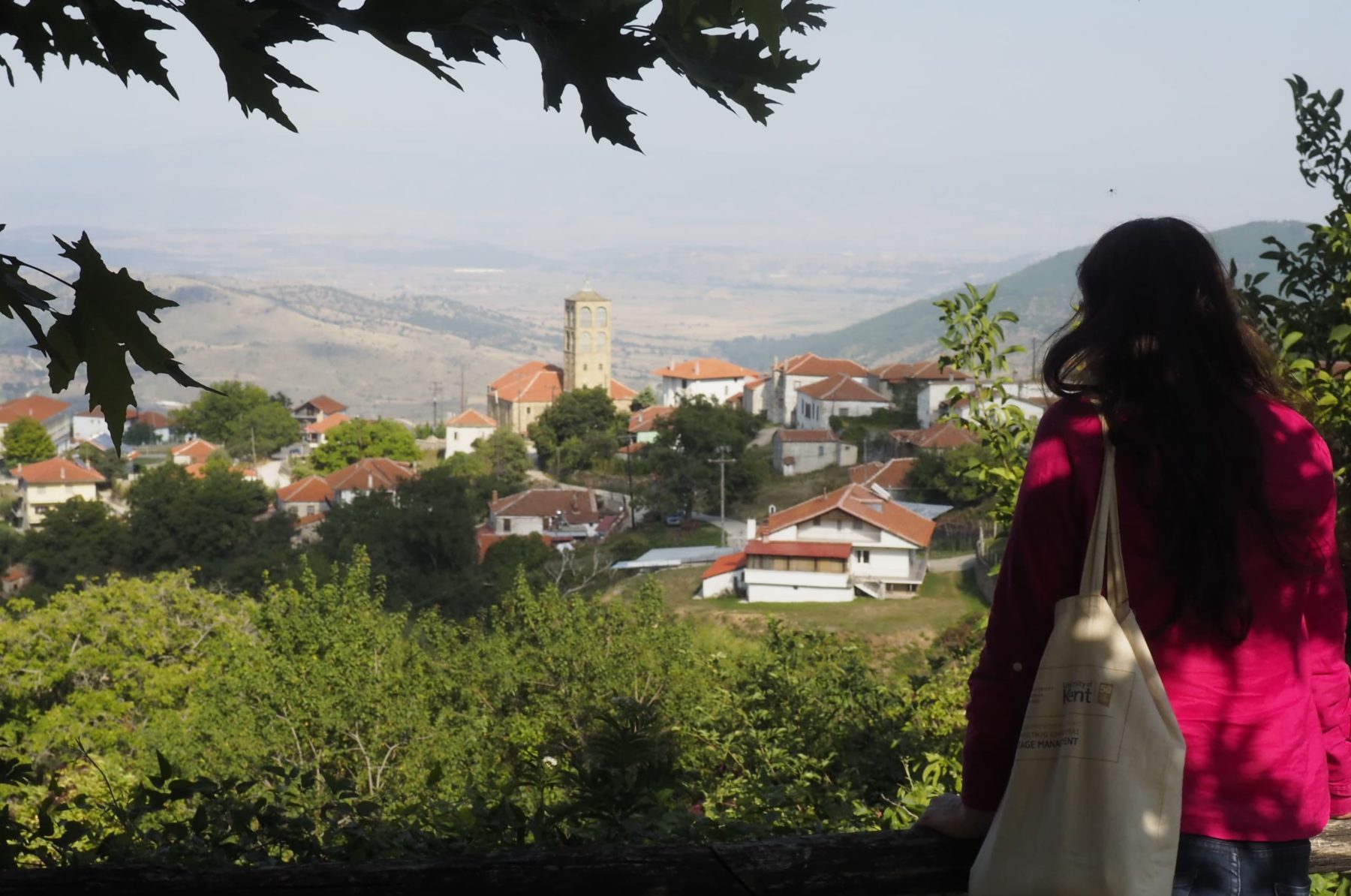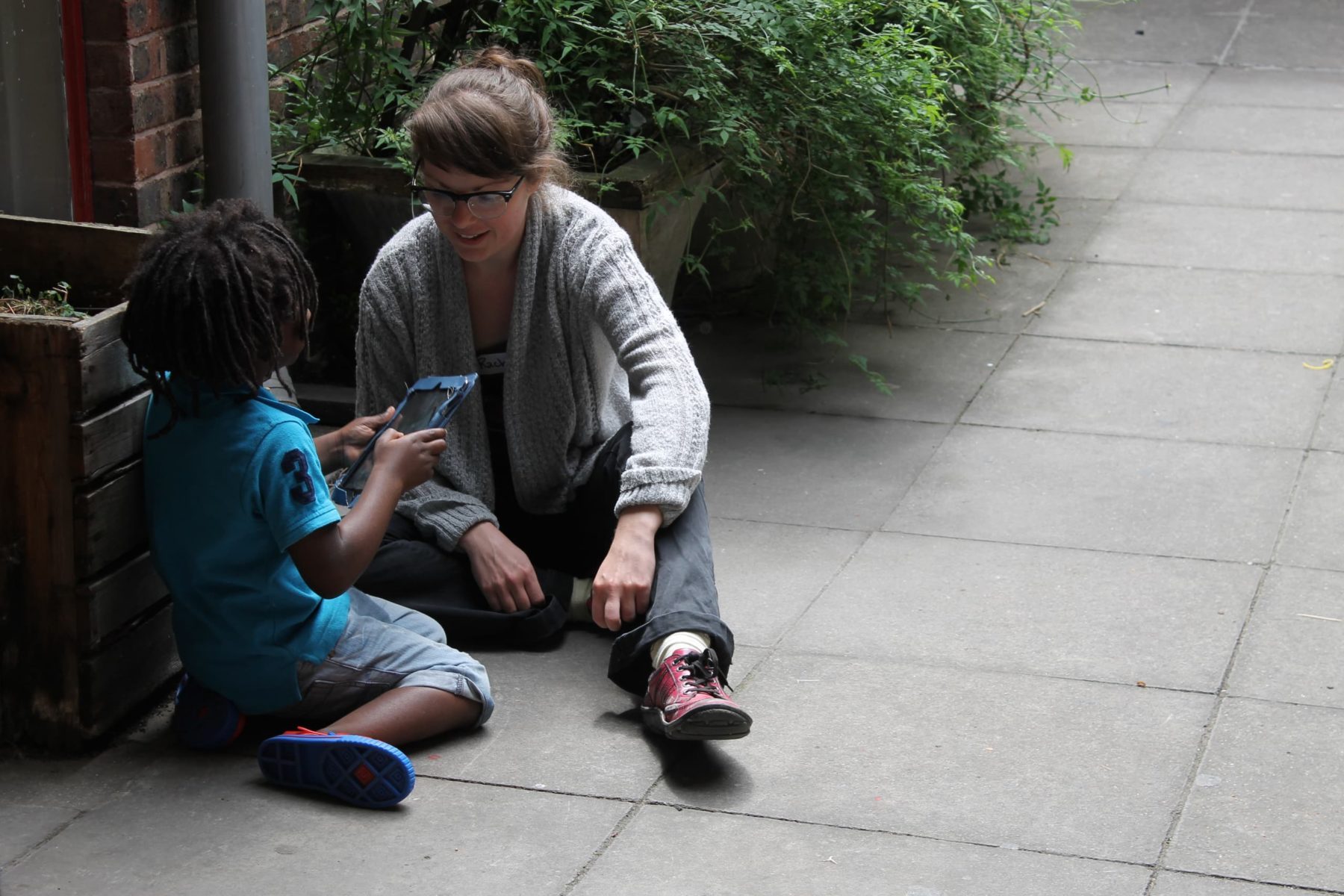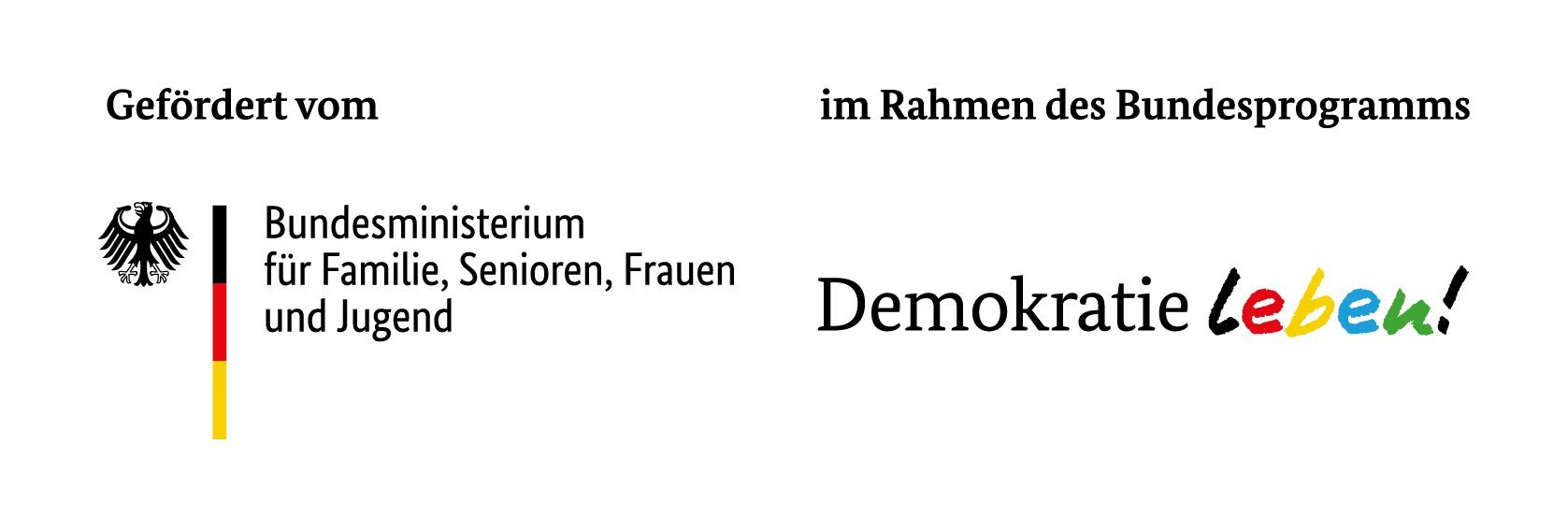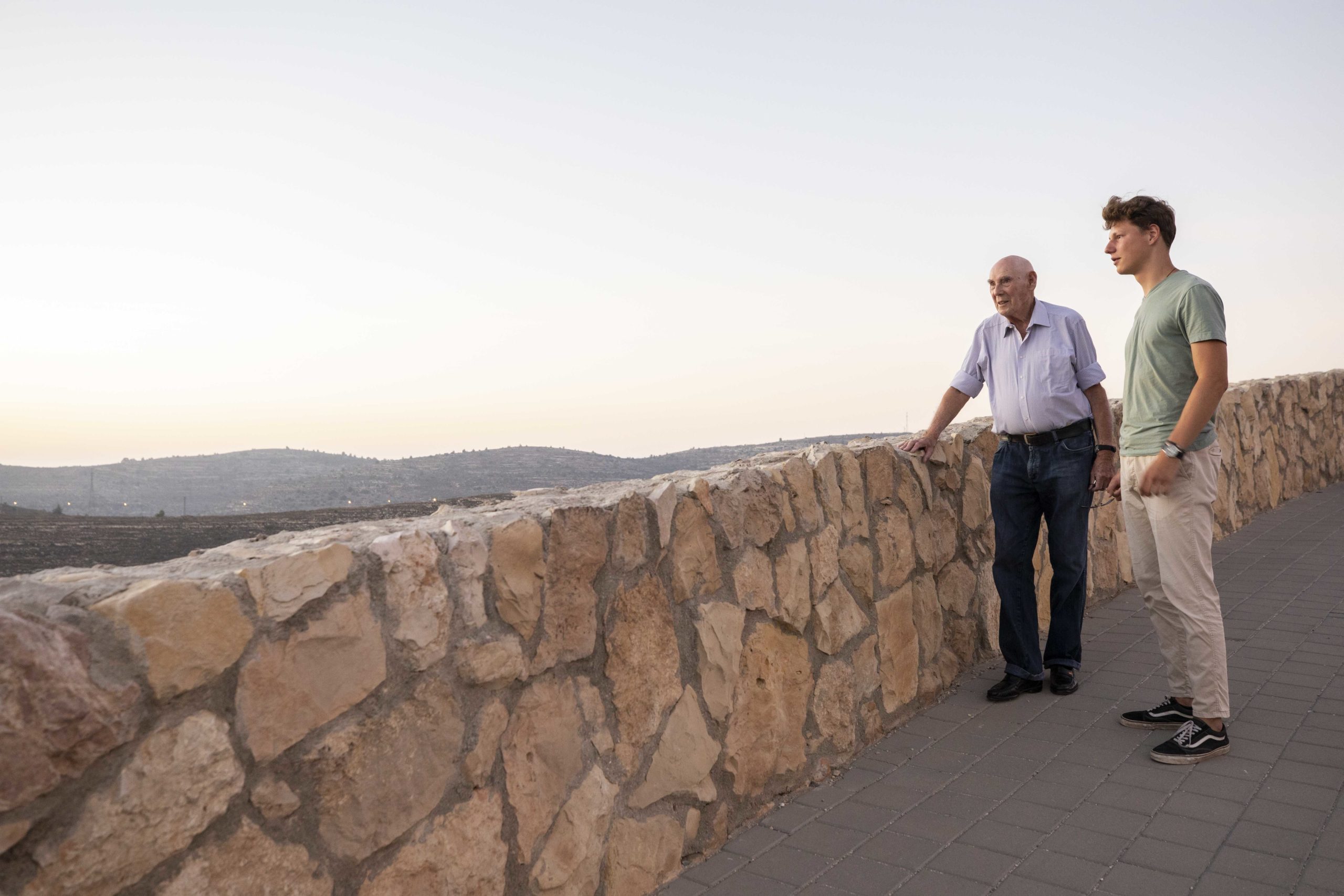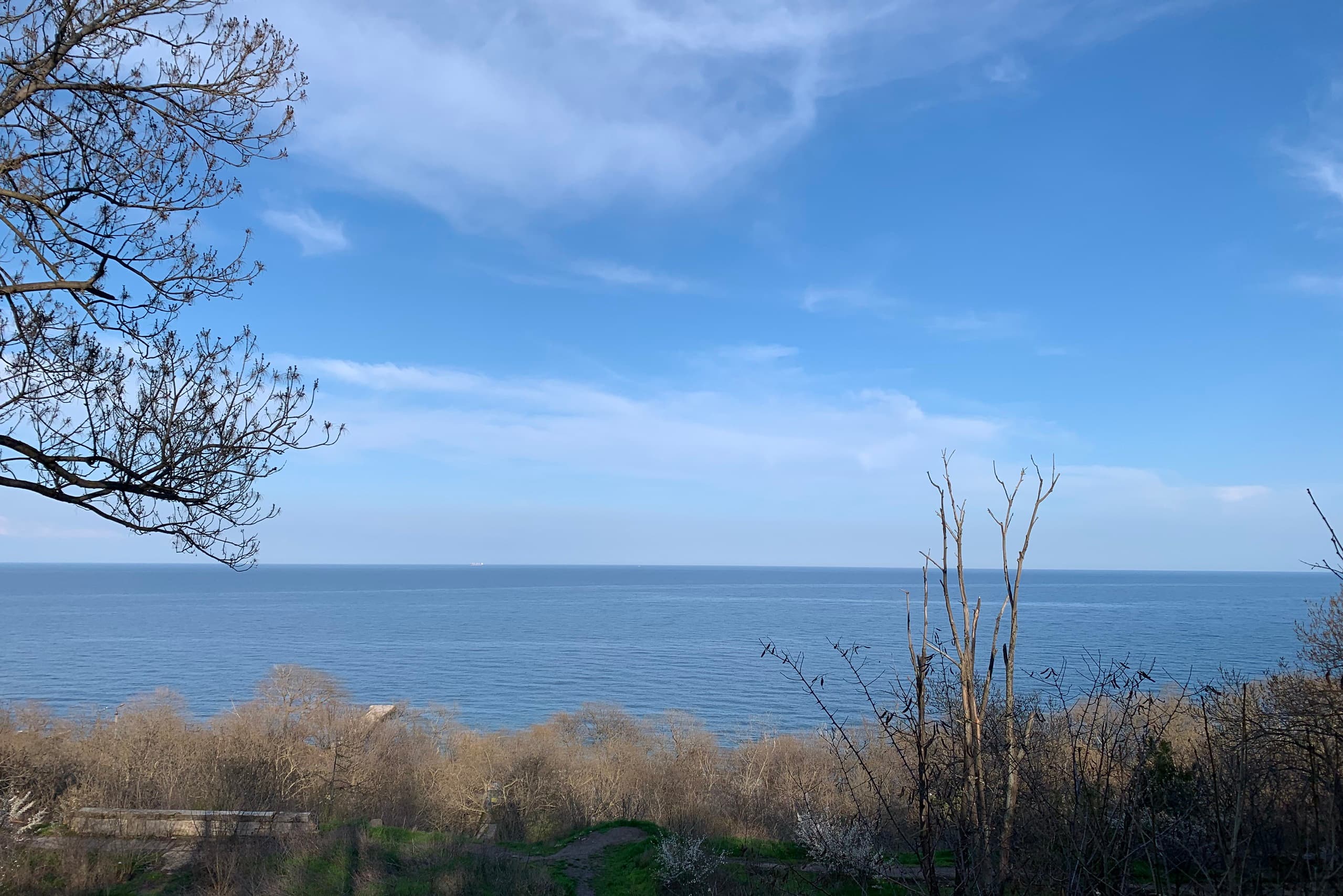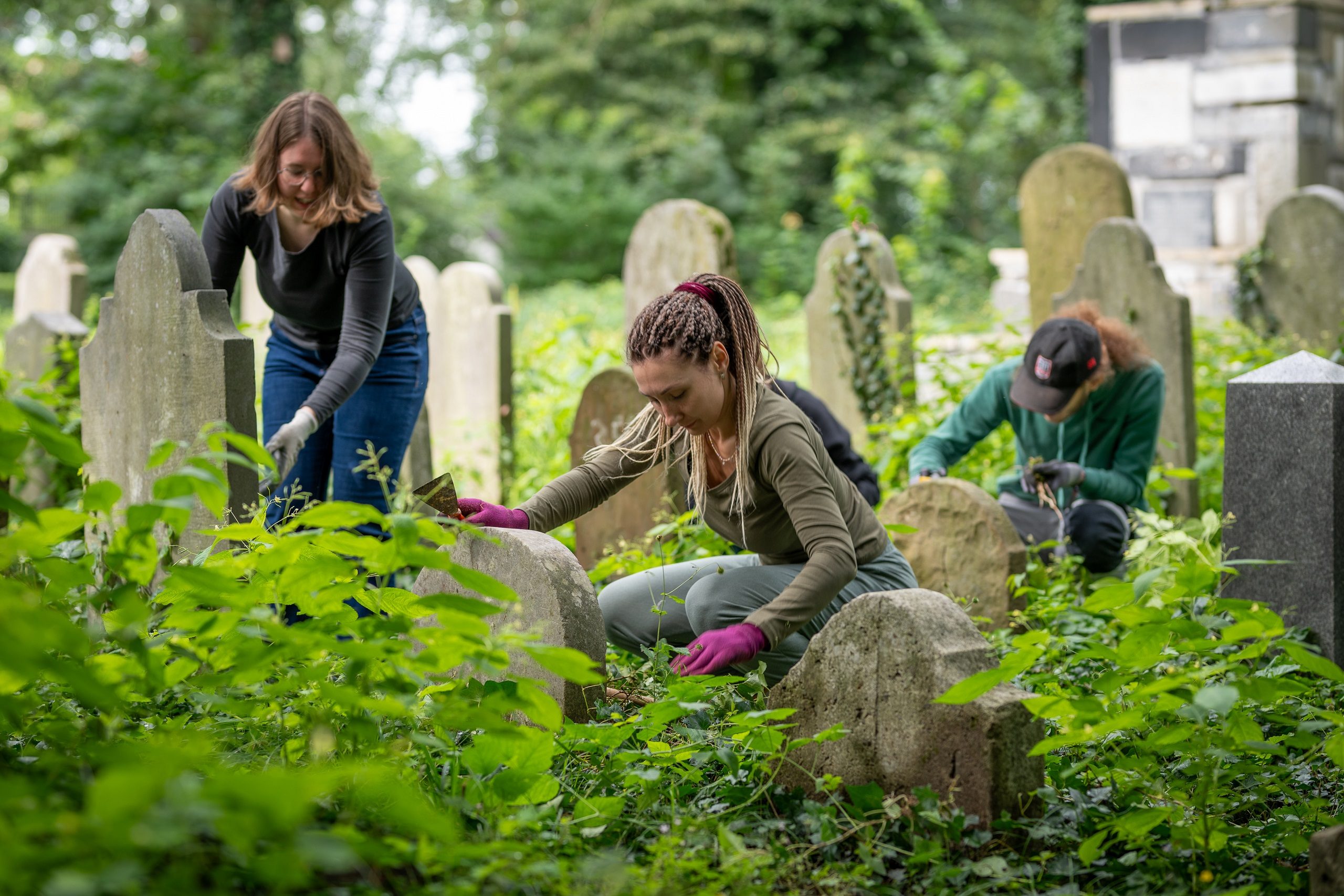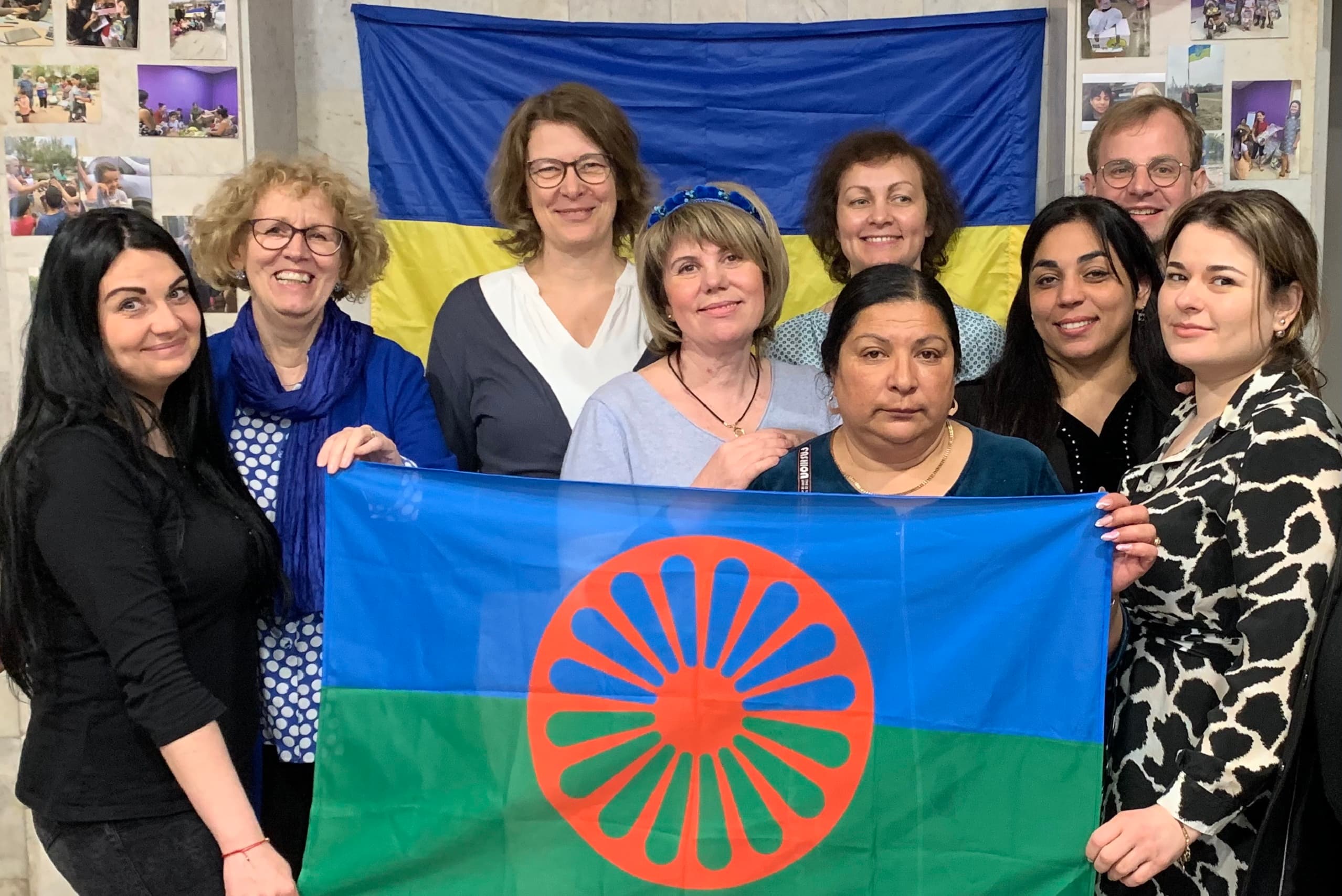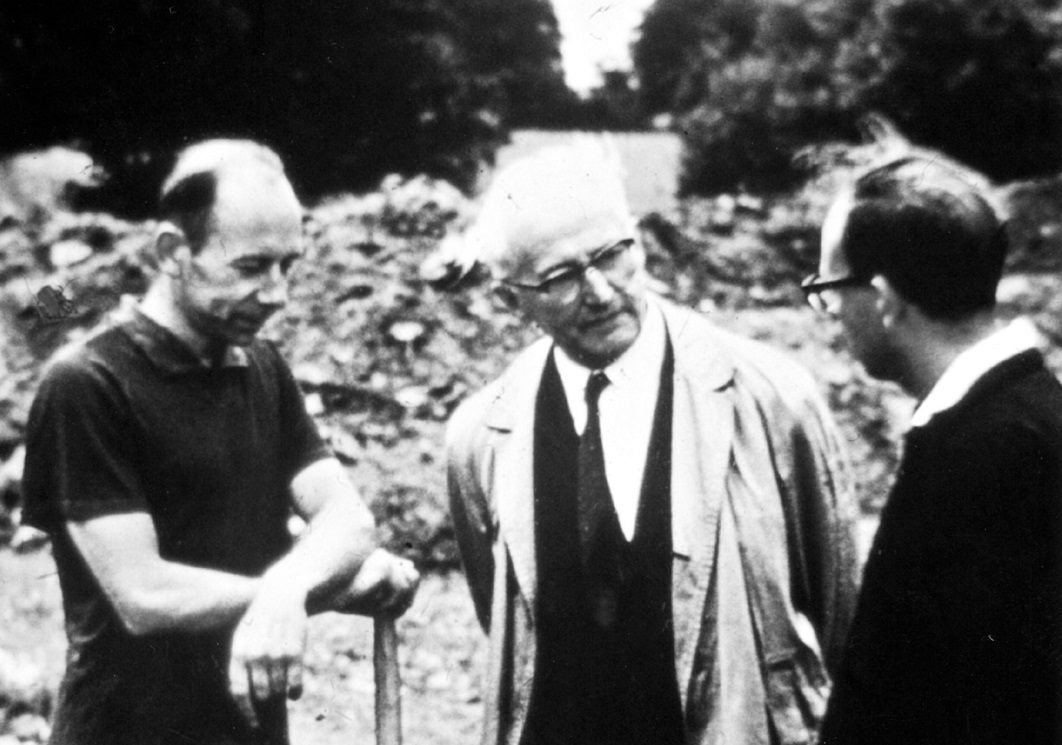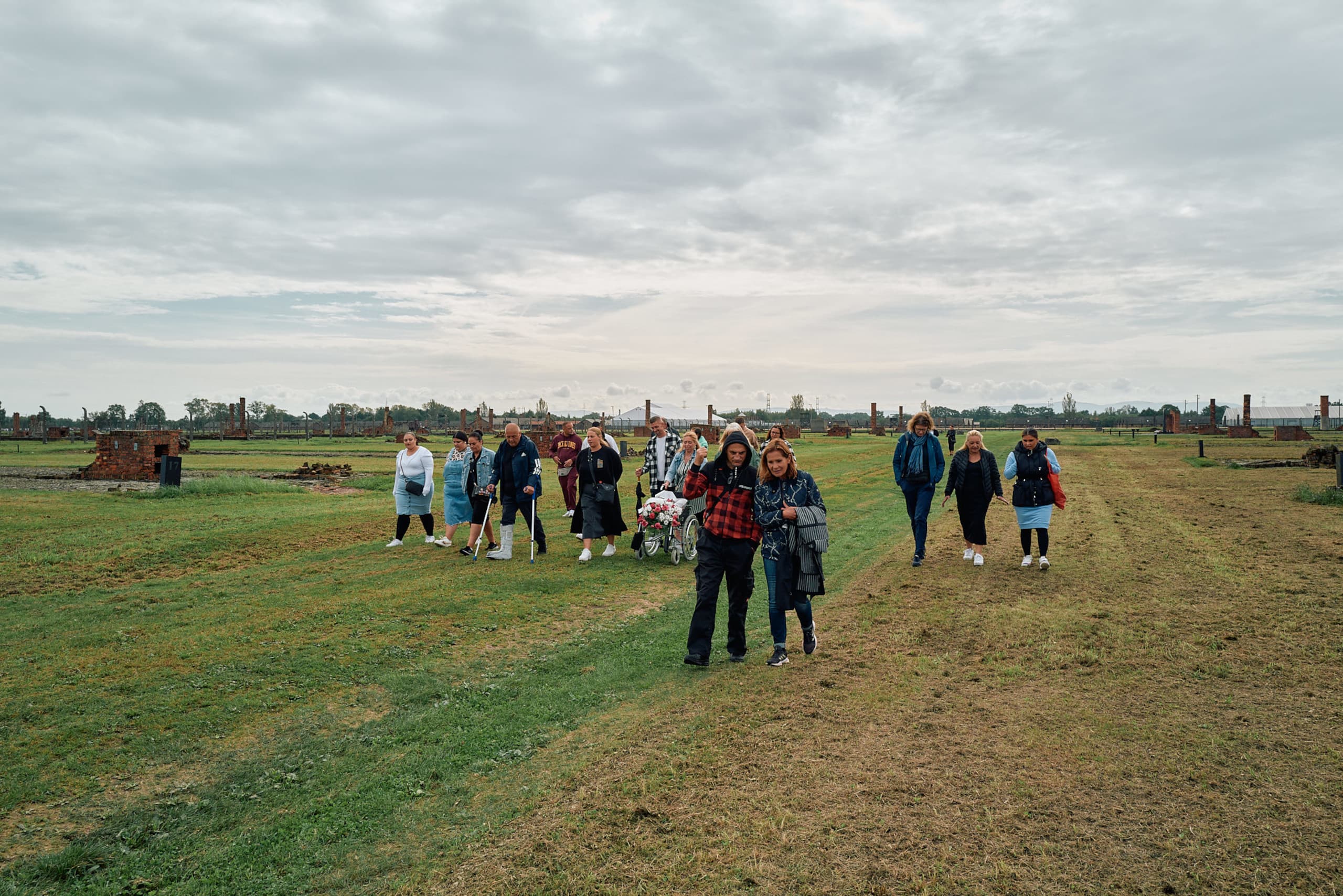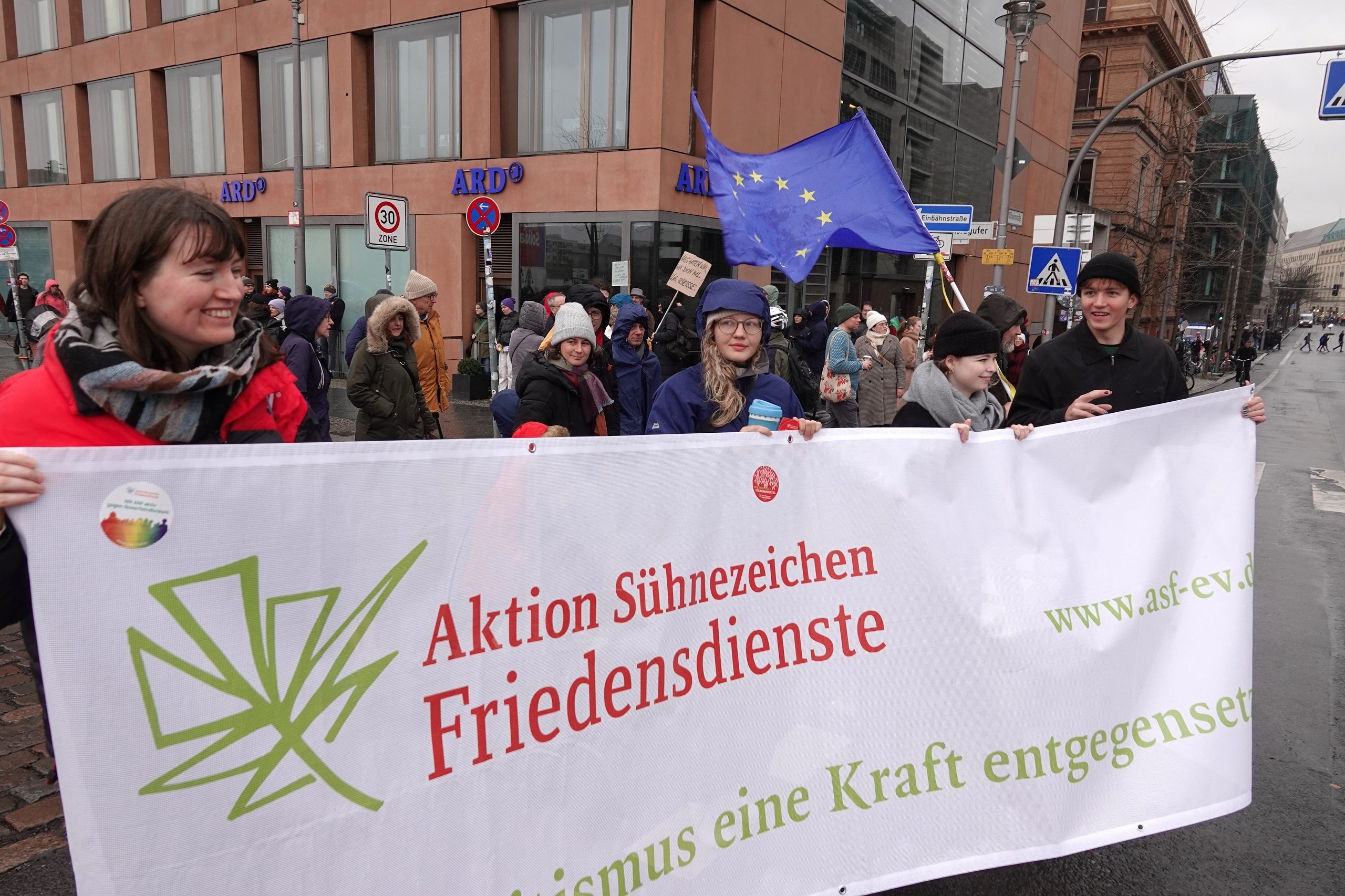Summer Camps
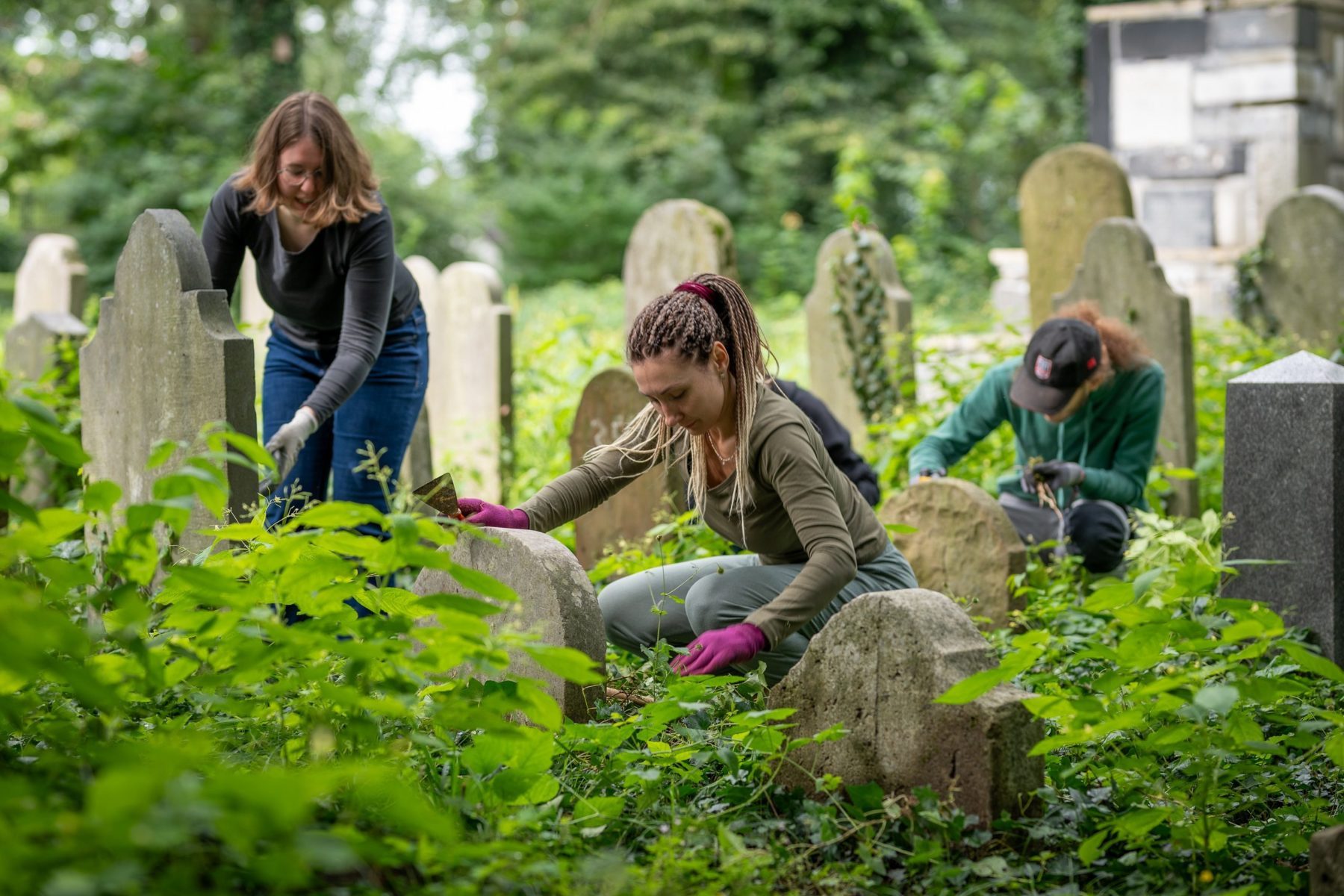
Every summer, international encounter projects take place in which people get involved in practical activities and at the same time engage in historical and cultural exchange. Two weeks of working, learning and experiencing history: ASF summer camps support Jewish communities in Europe, help at memorial sites or get involved in social and political projects. People aged 18-99 live and work together at the international summer camps. They exchange information about the history of the project location and the current situation in the country. Register now!
What is an ASF summer camp?
Two weeks of practical work, learning and experiencing history: Participants in the ASF summer camps support Jewish communities, help out at memorial sites and get involved in social, creative and political projects throughout Europe. People aged 18 to 99 live and work together at the international summer camps. They discuss the history of the project location and the current situation in the country.
Practical activities
Painting, gardening, building, archiving, researching, creative work and many other activities are carried out at the summer camps. Whether with or without previous experience – we believe that everyone can get involved. By working together, the participants show that international understanding across borders is possible and important. They take responsibility for current social developments and set an example for tolerance and democracy.
On the trail of history
Education and travelling belong together. Summer camps not only offer the opportunity to volunteer, but also to get to know other countries and cultures. Therefore, learning about the place and country in which the project takes place is part of every ASF summer camp. Each summer camp is centred around a particular theme that the participants engage with beyond the practical activities. This thematic exploration is the second pillar of the summer camps and offers a great deal of variety: excursions, exhibition visits, discussions with contemporary witnesses, workshops and much more.
Target groups
Regardless of the specific project and practical activity, we want to facilitate encounters between people of different cultural, ideological and social backgrounds. By talking to each other, we can experience the diversity that international participants bring to the table. The participation of people of different age groups and the exchange between generations at our summer camps is very important to ASF. However, some summer camps are restricted to people aged 18 to 30 or 35 due to funding conditions. With the summer camps for over 40s and intergenerational projects, we would particularly like to appeal to those volunteers who would like to get involved in a non-(only) youth group and experience history on site.
What do I do at summer camp?
Initiatives for democratic action, art and cultural projects, renovation work, research and archive work: the summer camp programme is as colourful as its participants are diverse.
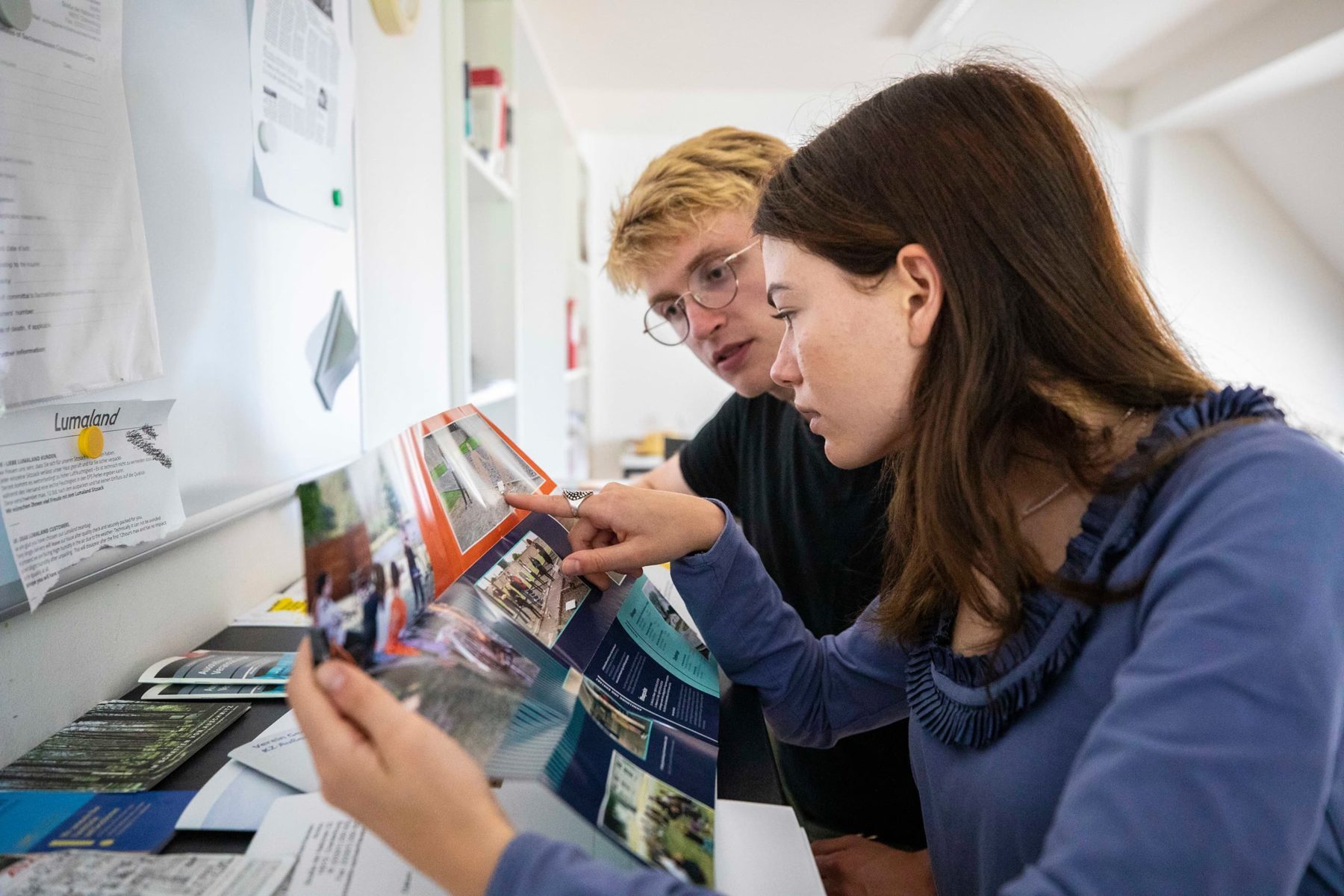
Many of the former concentration camps and work camps where people were imprisoned, tortured and murdered for ethnic, religious or political reasons during the Nazi era have been established as memorial sites today.
Part of our summer camp programme involves engaging in projects to help preserve and develop these historical sites, in particular the smaller, lesser known ones. Maintenance tasks include technical work and renovating, painting doors, weeding and creating memorial paths.
Another important area of work is the archival and historical research that is conducted to document individual experiences in the camps and develop prisoner biographies. This provides volunteers with an opportunity to work with original sources and historical artefacts and helps them to learn about the history of the memorial site. Summer camp participants can also become involved in translating brochures and catalogues into an easy-to-understand language for people with learning disabilities.
The work is accompanied by workshops and excursions related to the areas that participants focus on in their work. This allows the participants to not only look into the history of their own country, but to also have the chance to discuss issues such as right-wing extremism, exclusion, racism and coming to terms with history in an international context with other participants. These discussions are supported by excursions to other memorial sites, concentration camps and religious places. Most volunteers highly value the experience of meeting a survivor. The personal recollections about life in the camp make the site and its history more comprehensible to the participants.
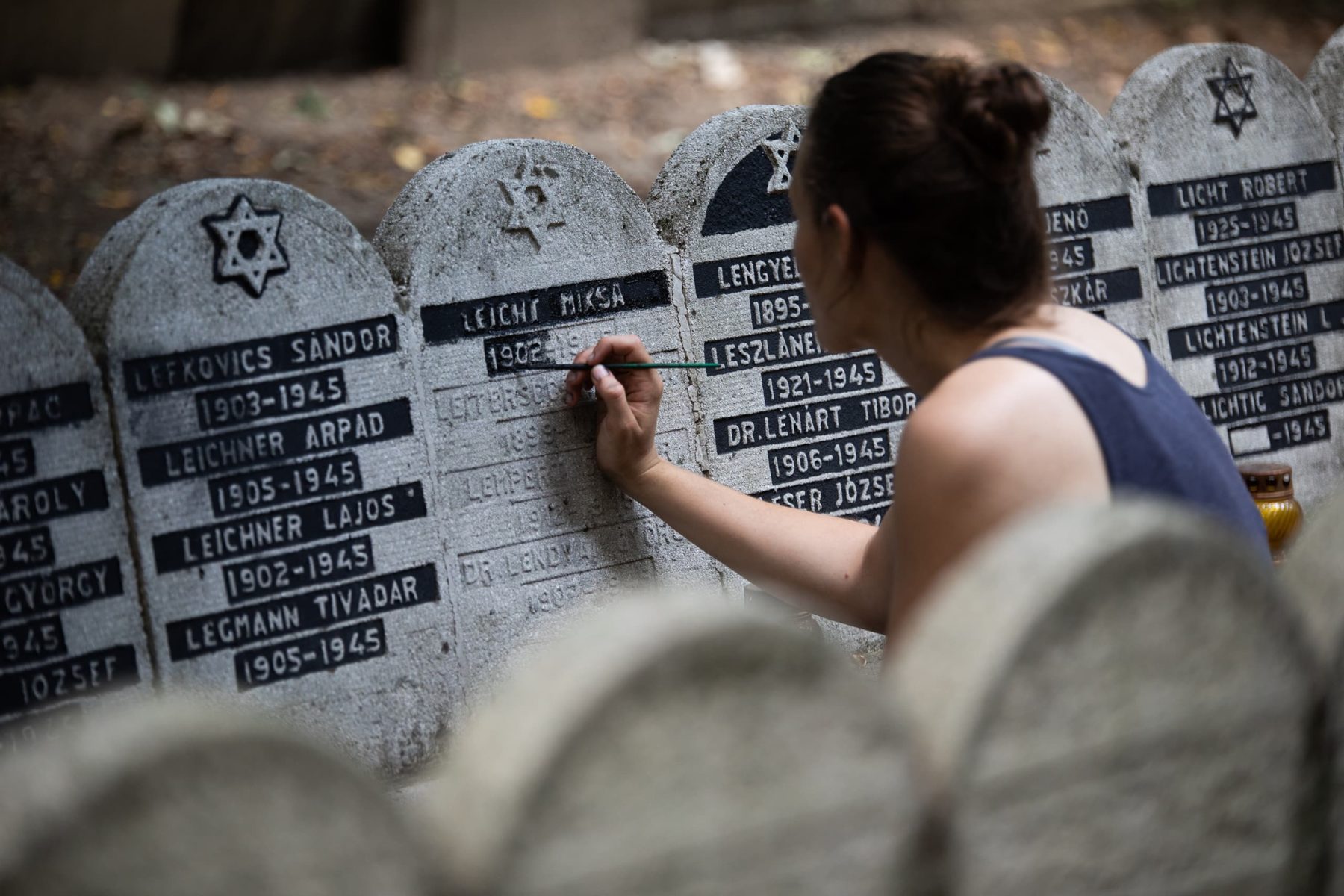
Past and present-day Europe could not be imaginable without the cultural legacy of the Jewish community and the mutual exchange between Jews and non-Jews. The Nazi obsession with race and extermination succeeded in almost completely eradicating Jewish life in Europe. In the summer camps we commemorate the people who were torn from the middle of Europe and we search for traces of European Judaism’s cultural diversity.
Literature, music, art, religion, politics and research: In all areas of life we encounter traces of Jewish culture and creativity in Europe. Almost eighty percent of the Jewish population worldwide has its roots in the countries of Central and Eastern Europe.
With our work in the summer projects we want to support the present, often small, Jewish communities that have been able to preserve their cultural legacy. For this reason the participants often work at Jewish cemeteries, clearing old paths, cleaning gravestones, removing weeds and helping to make the cemetery into a venerable place of remembrance. Jewish cemeteries continue to be vandalized still today. Our efforts against vandalism are an attempt to honour the people who have found a resting place in these graveyards. We also want to help those who are no longer able to care for the grave of their parents or grandparents, either because they were forced to leave the country or were murdered by the Nazis. Both young and older participants take a stance against anti-Semitism and racism.
Our work is not limited to commemoration. We also try to establish a lively exchange between Jewish and non-Jewish participants and project partners. Often groups are able to observe a Sabbath service and engage in intense talks about religion, current Judaism, everyday life, art and music and much more.
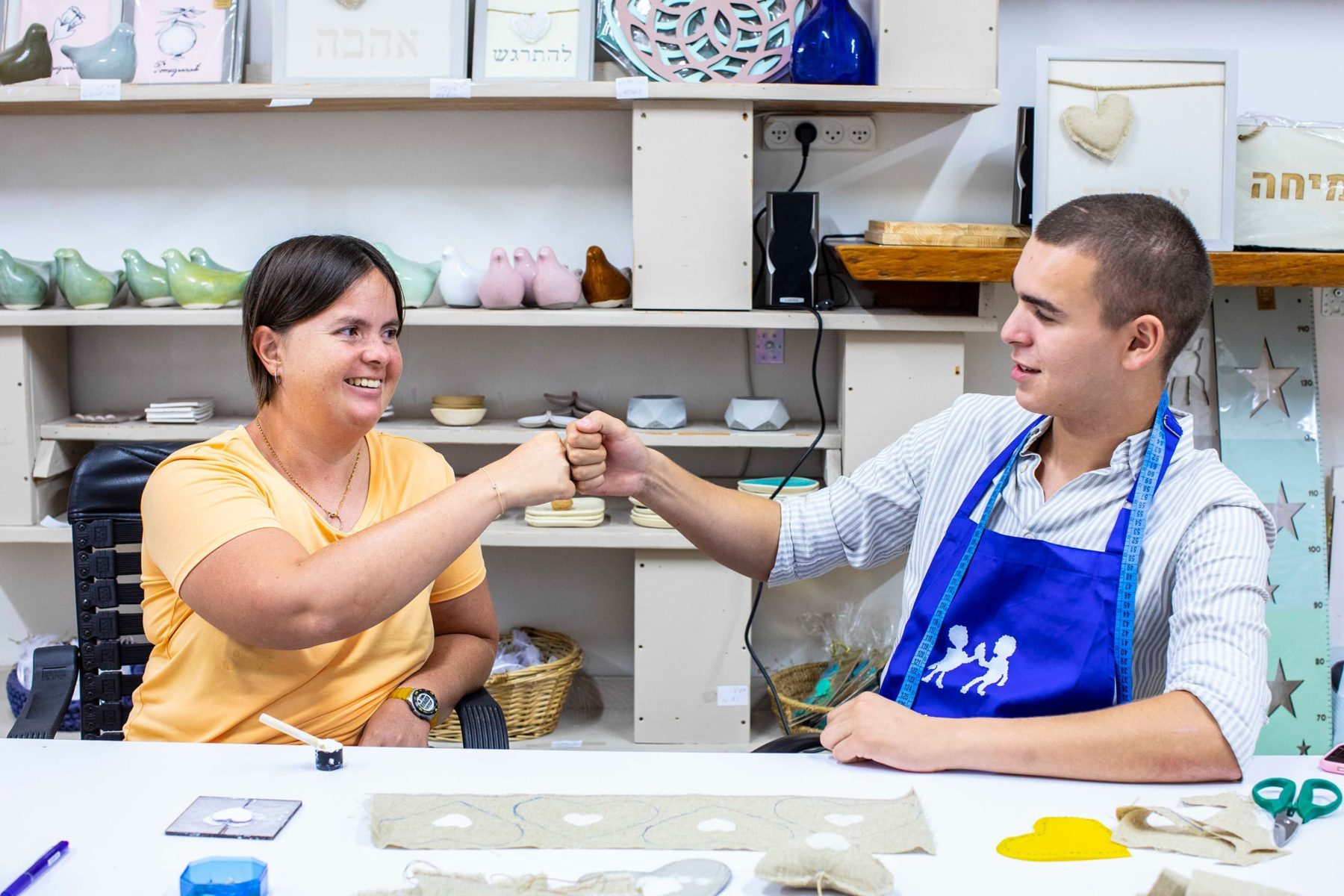
Each summer camp is unique. No single programme heading could possible characterize or unify all the areas of work covered by the many diverse programmes offered by ARSP. Many are based on creative ideas for peace and reconciliation work and bring together different fields of work. Hence we invite you to read about the individual programs and summer camps under the general heading “other projects.”
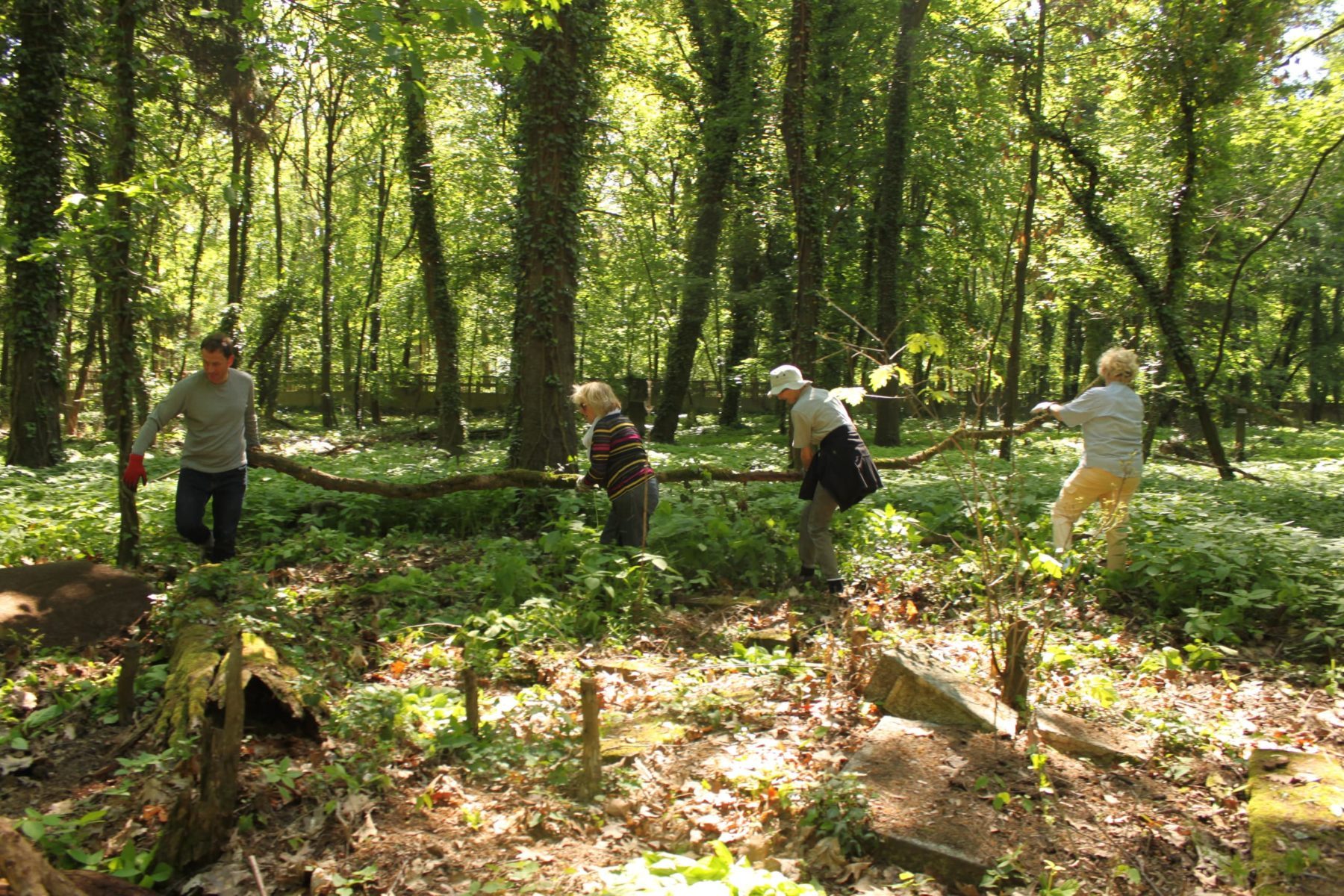
What does Summer Camp for people over 40 mean?
With the summer camps for people over 40 we would like to address especially those volunteers who like to work in a non-youth group and experience history(s) on site. In general, however, we understand the work in the ASF peace services as an open offer for people of every generation. Members of this generation can register for all other projects as well as younger interested people can support the summer camps for people over 40. For the participation in a summer camp for people over 40, however, the registrations of older participants will be considered preferentially.
With the summer camps for people over 40 we would like to address especially those volunteers who like to work in a non-youth group and experience history(s) on site. In general, however, we understand the work in the ASF peace services as an open offer for people of every generation. Members of this generation can register for all other projects as well as younger interested people can support the summer camps for people over 40. For the participation in a summer camp for people over 40, however, the registrations of older participants will be considered preferentially.
Who can participate?
Everyone can participate who is able to do the physical work in the one to two week projects and enjoys dealing with the culture, history and current situation in the respective summer camp country. The amount of work varies from summer camp to summer camp and is usually 5-6 hours.
How does the registration work?
Registration for the summer camps for people over 40 began in April 2023. Initially, all registrations are collected. Upon acceptance for a summer camp, the International Summer Camps Office sends out an email asking for payment of the participation fee. The team leaders of the summer camps will then contact the participants and inform them about the current status of the planning.
What does the participation cost?
For the participation, including meals, program and accommodation we ask for a contribution according to the information in the section costs. We will be happy to advise participants on booking their travel to and from the event, but we cannot assume the costs for this.
Impressions
Program
Here you will find an overview of the 2024 summer camp programme. Registration for the 2024 summer camps is now open.
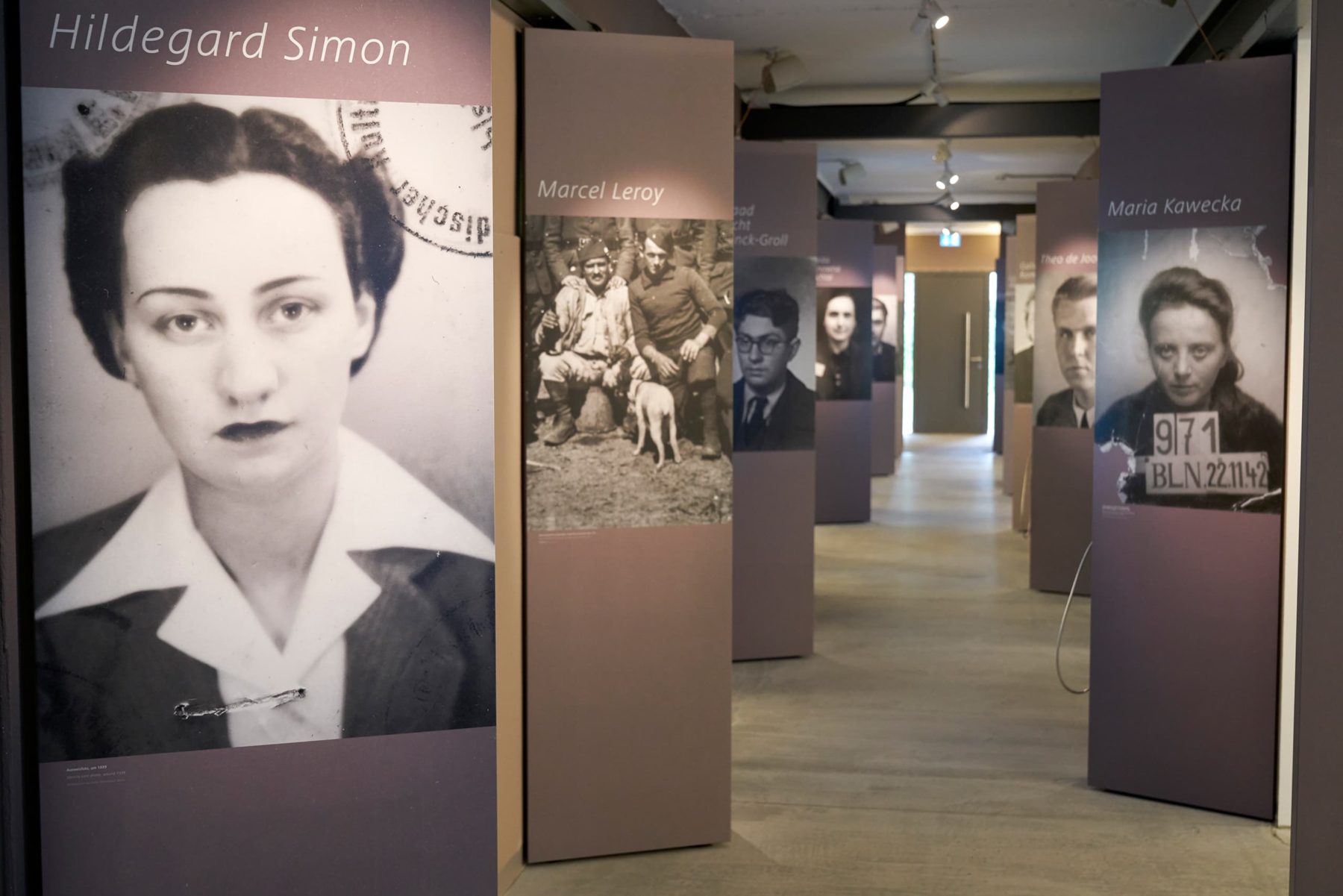
ASF Summer Camp in Berlin-Schöneweide, Germany
“A Short Film on the Topic of Nazi Forced Labour”
31.07. – 10.08.2024 (international, 18-30 years old)
The International Youth Meeting Centre (IYMC) is part of the Nazi Forced Labour Documentation Centre that is located on the grounds of an almost completely intact former forced labour camp in Berlin Schöneweide. The exhibitions, archives, and educational programmes focus on a forgotten victim group: about 8.4 million civilians from all over Europe (up until 2006 without their own memorial site) were forced to work for the Nazi regime during World War II.
“A Short Film on the Topic of Nazi Forced Labour”
The International Youth Meeting Center opened in 2015 on the grounds of the documentation center. It offers a place where young people from different countries and cultures come together, discuss and learn together. Using the example of the Nazi dictatorship and forced labour, the participants deal with the mechanisms of exclusion and exploitation.
During the summer camp, the participants deal with the life stories of the former forced labourers. Through guided tours, workshops and work with various historical sources – especially biographies and interviews – the participants will gain an insight into the everyday life of the former forced labourers. The structures, organisation and ideology of Nazi forced labour will also be examined. In terms of content and topic, we focus on Nazi forced labour and gender.
In the practical part, the participants learn basics of theater and performance work. Together we will explore scenic realizations for their content-related work regarding forced labor. We will use the site of the Nazi Forced Labour Documentation Centre and the prepared historical sources for the scenes. These scenes will be filmed and will result in a short film that is an artistic/performative representation of the participants’ work.
Staged performance work will be enhanced by tours of the Nazi Forced Labour Documentation Center and other historical sites in Berlin.
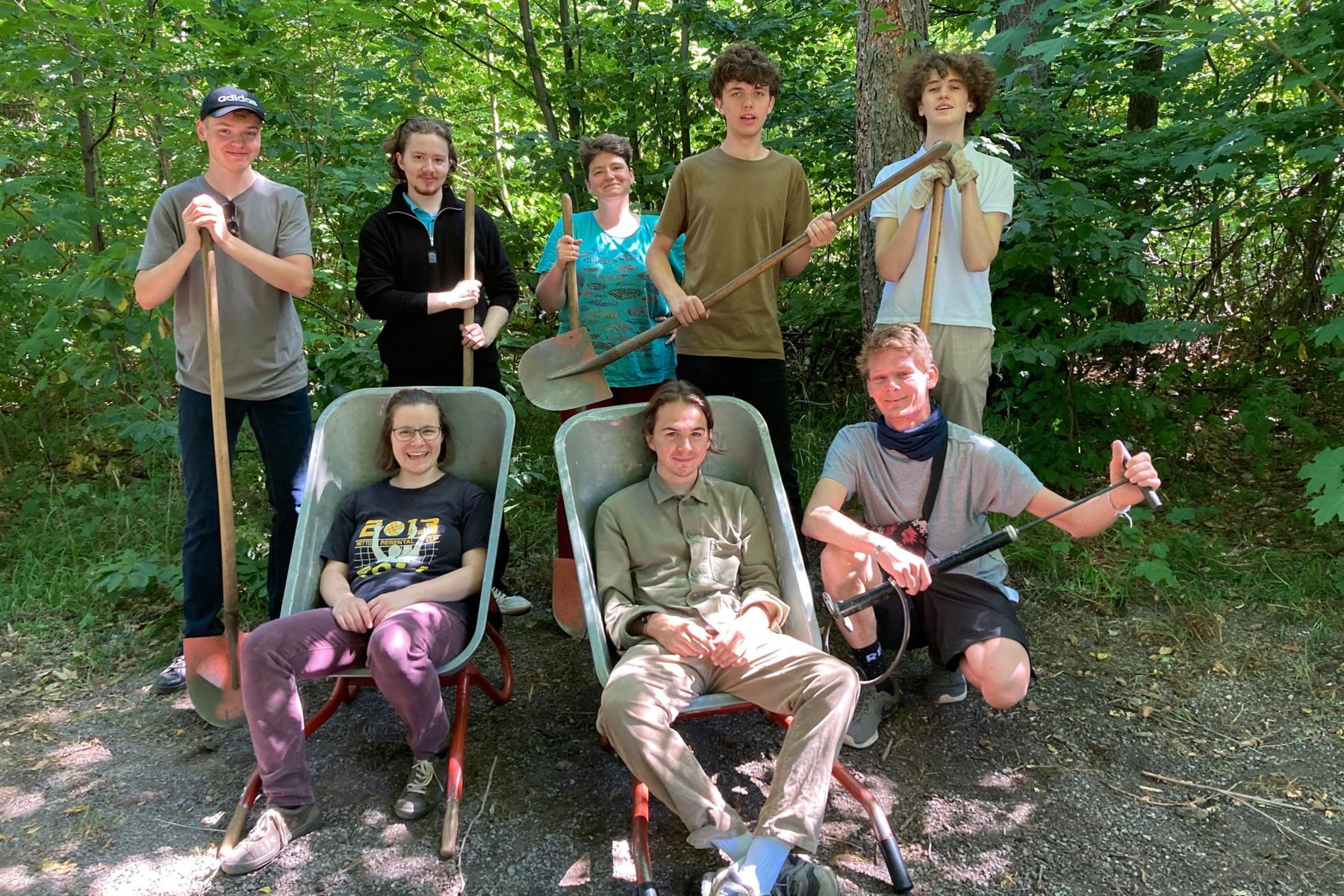
Sommerlager Weimar-Buchenwald
21.07-03.08.2024 (18-35 years old, international)
Buchenwald has a multi-layered and ambiguous history. The participants of the summer camp deal with this history in various ways with content-related support from the memorial.
In 1937, the Buchenwald concentration camp was built on the Ettersberg near Weimar. It was one of the largest camps on German territory. In February 1945, over 112.000 men and women from 60 different countries were imprisoned in Buchenwald and its associated satellite camps. They had to do mostly hard forced labor, which since 1942 occurred especially within German weapon industry. At least 56,000 people did not survive.
From 1945 to 1950, the Soviet occupying forces used the site as a special camp. Most of the buildings were demolished after 1950. In the newly-founded GDR, a memorial to the “anti-fascist resistance” was to be built. The “National GDR Memorial Buchenwald” was inaugurated in 1958. Since the 1990s, numerous changes have been made to the memorial site to commemorate more and other groups of victims. Two permanent exhibitions provide information about the history of the concentration camp and about the Soviet special camp. There is also an art exhibition.
In addition to practical and maintenance work on the hiking trail called “Buchenwald Railway Memorial Trail” (along the former railway tracks) and / or in the memorial on the former camp grounds, the participants of the summer camp will deal with the complex past of the site. On the hiking trail, they can engrave the names of deported children and young people on stones, or they can restore objects found during excavations in the restoration workshop. The proximity of the camp to the city of Weimar, which is important for German history and culture, will be discussed. The handling and representation of Buchenwald’s multi-layered story from 1945 until today will also be a topic. In addition to the place itself with its preserved buildings and remaining foundations, there are numerous opportunities for research through texts, photographs, drawings, found objects, archives, audio and film material and much more.
Buchenwald near Weimar has a multi-layered and ambiguous history. The participants of the summer camp deal with this history in various ways with content-related support from the educational department of the memorial.
In 1937, the National Socialist Buchenwald concentration camp was built on the Ettersberg near Weimar. It was one of the largest camps on German territory. In February 1945, over 112.000 people from 60 different countries were imprisoned in Buchenwald and its associated satellite camps. They had to do mostly hard forced labor, which since 1942 occurred especially within German weapon industry. At least 56,000 people did not survive.
From 1945 to 1950, the Soviet occupying forces used the site as a special camp. Most of the buildings were demolished after 1950. In the newly-founded GDR, a memorial to the anti-fascist resistance was to be built. The “National GDR Memorial Buchenwald” was inaugurated in 1958. Since the 1990s, numerous changes have been made to the memorial site to commemorate more and other groups of victims. Two permanent exhibitions provide information about the history of the concentration camp and about the Soviet special camp. There is also an art exhibition.
In addition to practical and maintenance work on the hiking trail called “Buchenwald Railway Memorial Trail” (along the former railway tracks) and / or in the memorial on the former camp grounds, the participants of the summer camp will deal with the complex past of the site. On the hiking trail, they can engrave the names of deported children and young people on stones, or they can restore objects found during excavations in the restoration workshop. The proximity of the camp to the city of Weimar, which is important for German history and culture, will be discussed. The handling and representation of Buchenwald’s multi-layered story from 1945 until today will also be a topic. In addition to the place itself with its preserved buildings and remaining foundations, there are numerous opportunities for research through texts, photographs, drawings, found objects, archives, audio and film material and much more.
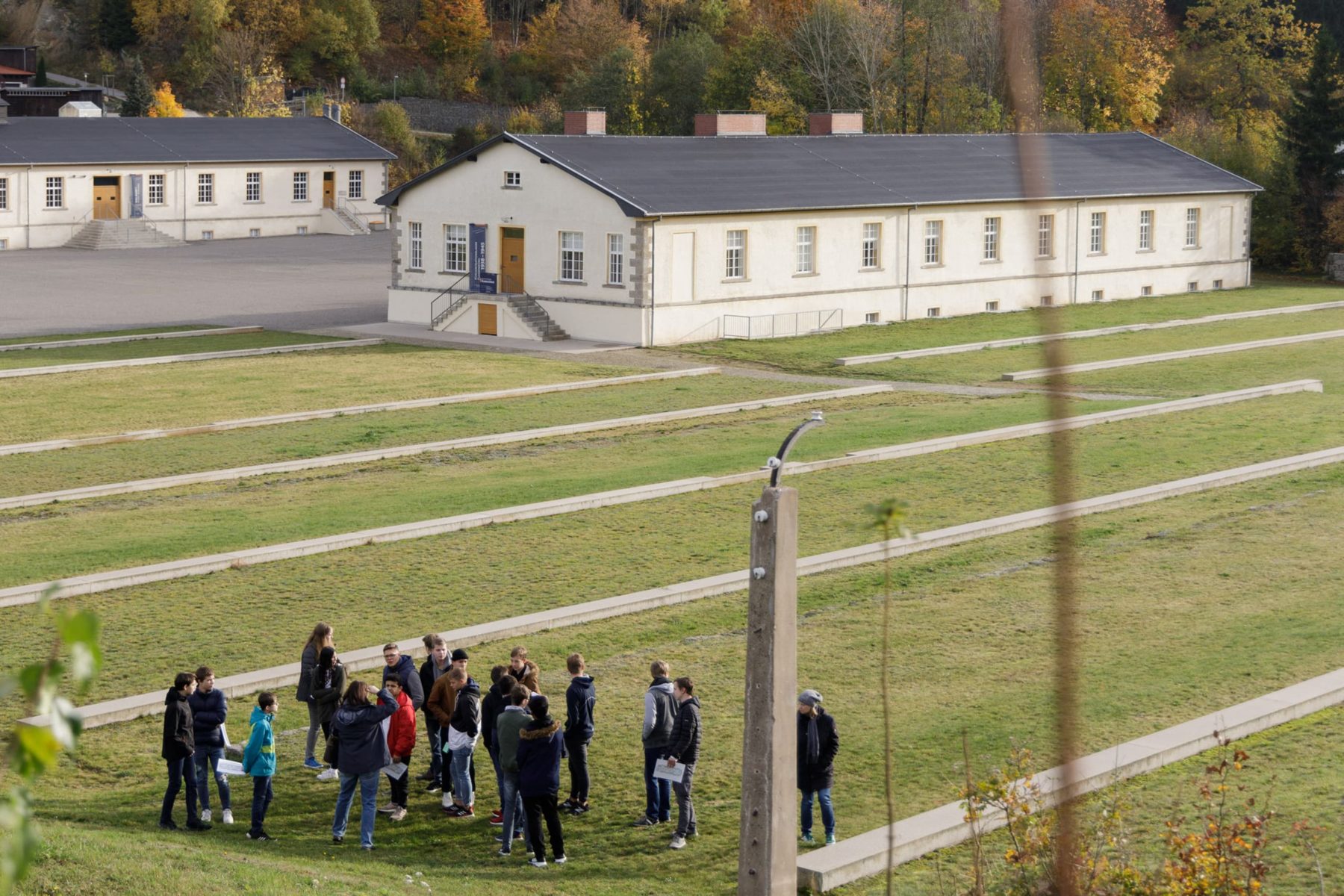
Digital archive work
23.07.-03.08.2024 (18-35 years old, international)
The ASF summer camp takes place at the Flossenbürg Concentration Camp Memorial and offers you the opportunity to engage intensively with the history of the site as well as with current issues of remembrance of National Socialism. The focus will be on working with the digital database and research platform “Memorial Archives”.
In summer 2024, a summer camp will take place for the fourth time at the Flossenbürg concentration camp memorial site. Flossenbürg is located in Bavaria, close to the Czech border. In 1938, the SS set up a camp there to exploit prisoners through forced labor in the granite quarry and later in the armaments production of the Messerschmitt company. Around 100,000 prisoners from 35 countries were held in the Flossenbürg concentration camp and its satellite camps. At least 30,000 prisoners did not survive the camp complex.
There are traces and evidence of these crimes here in Flossenbürg. The summer camp offers you the opportunity to engage intensively with the historical site, discuss your observations with the other participants and reflect on your own views of history. Almost 80 years after the end of National Socialism, we will explore the question of what this history has to do with us and what it means today. Everyone will bring their own topics to this place, which we can explore in greater depth by looking at the history of National Socialism. The starting point for this is always the question of what actually happened in this place.
By working on the digital archive “Memorial Archives” during the summer camp, you will gain an in-depth insight into the day-to-day detective work of the memorial and the current standards of archive work around the database and research platform “Memorial Archives”. If you want to know more in advance, take a look at our online platform “Research Stories”: https://www.researchstories.net/de
In addition to the on-site work, the program is supplemented by a thematic excursion (e.g. to Nuremberg) and an experience-oriented supporting program. Joint sporting and cultural leisure activities strengthen team spirit and provide a balance to the intensive exchange of content.
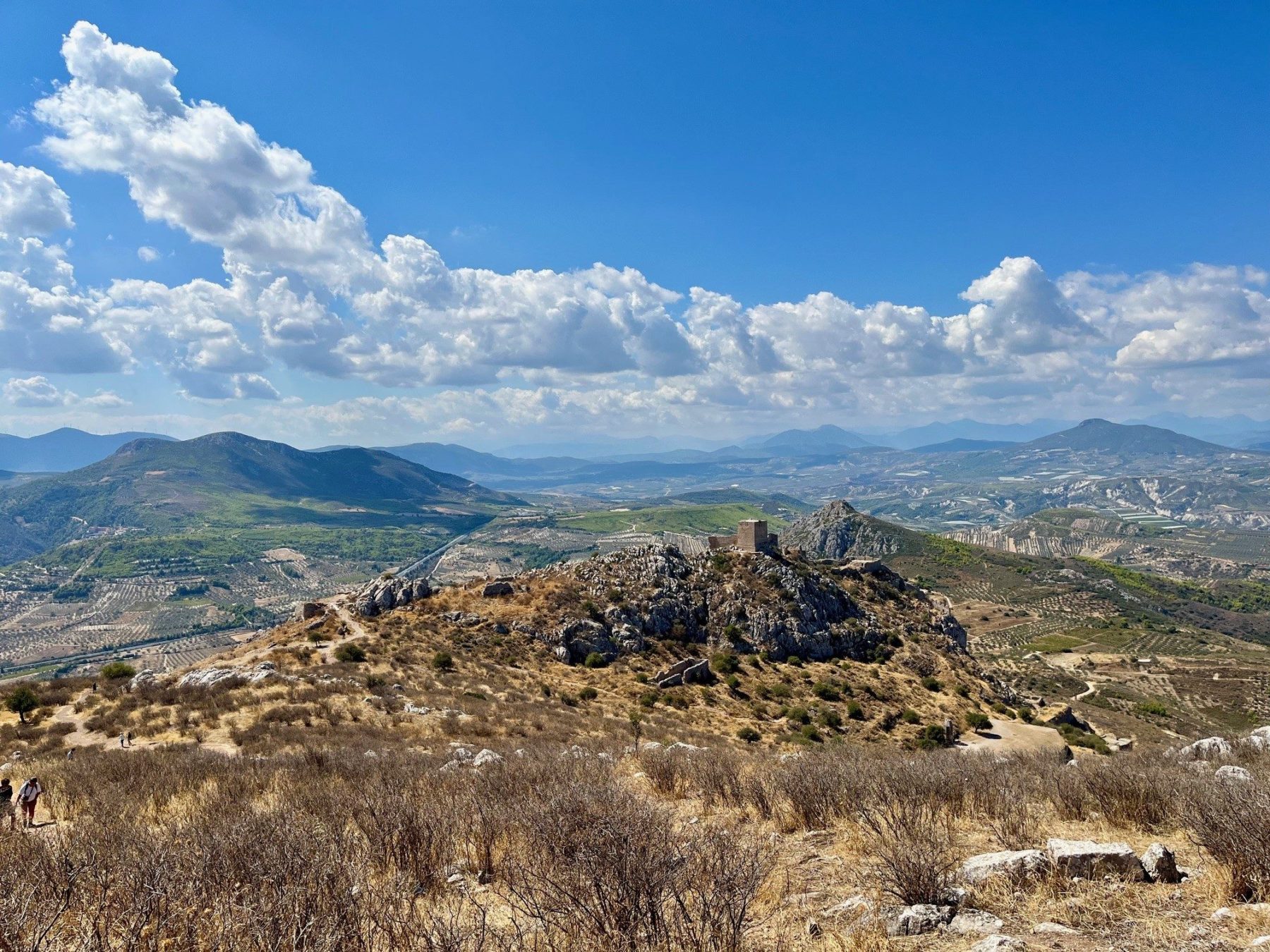
Summer camp in Kryoneri Korinthias, Greece
25.06.-07.07.2024 (International, for participants aged 18 and over with residence within the EU)
On paths of remembrance – on the trail of civil courage
Kryoneri is a lively mountain village in the Peloponnese, high above the gulf and the city of Corinth. During the German occupation, courageous residents hid the six-year-old Jewish girl Rivka Kamhi and her family here. Rivka survived the terror of the Shoah and was rescued. She now lives in Israel.
At this international summer camp, you will learn the story of Rivka’s rescue and can help to save her from oblivion. Together with over 20 other participants from various EU countries, you will uncover and maintain paths and hiking trails around the village, thereby preserving access to historical sites. You will also gain fascinating insights into the history of the German occupation of Greece and its impact on the civilian population.
Courage and civil courage are needed at all times. At this summer camp, you can discuss forms of anti-Semitism, racism and exclusion in our time with other international participants. Together you can think about what you can do against it today.
This summer camp is a cooperation with our Greek partner FILOXENIA. https://filox.org/
The village and the surrounding area are mountainous and unfortunately not barrier-free.
This summer camp is funded by the European Union (CERV – Citizens, Equality, Rights and Values program). Thanks to this funding, you do not pay a participation fee. All summer camp costs (accommodation, meals, program and excursions) are financed by the EU.
You will have to pay for your own travel to and from the camp. This may include costs for the flight to Greece or for trains, buses and ferries. There is a good train connection from Athens (city and airport) via Corinth to Kiato. The cost of the return journey from Athens to Kiato is around 20 euros.
Σας περιμένουμε με χαρά!
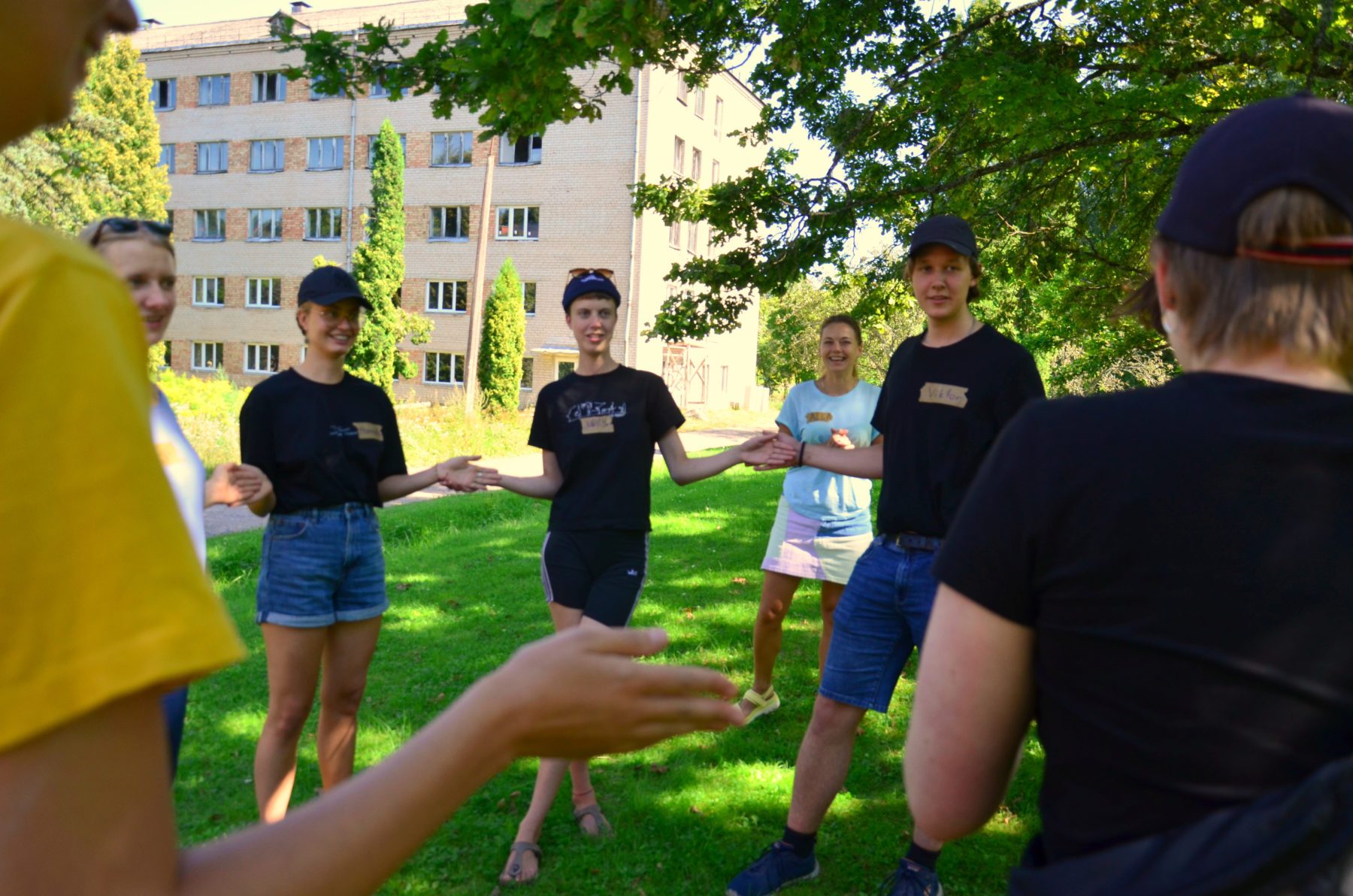
Sommerlager Višķi, Lettland
19.08.-29.08.2024 (18-30 years old, international)
Jewish life in rural areas
Višķi is a town near Daugavpils in south-east Latvia – a beautiful place surrounded by three lakes. Višķi was once a typical Jewish shtetl (village), like thousands of other smaller and larger villages and towns in Eastern Europe. Today, the foundations of the former synagogue, the cemetery and places where Jews used to live are three silent witnesses to Jewish life.
The summer camp in Višķi is being organised for the third time by ASF, the association “Drei Stufen e.V.” (Osnabrück) and the local community. The work, which began in 2022, will continue this year. Helpers are once again needed to safeguard Jewish cultural heritage in rural areas.
Specifically, the participants’ practical work at the old Jewish cemetery will contribute to the construction of the future open-air ensemble museum. Restoration, gardening and cleaning work will be carried out under the guidance of specialised staff.
During the summer camp, two signposts will also be unveiled, bringing the Jewish traces in today’s Višķi back to light. The work in Višķi will also be complemented by a thematic approach to the history of the multi-ethnic and multi-confessional place and references to Jewish culture in Latvia in the past and present.
The work camp aims to give young people from different countries in particular an insight into the history of Latvia and Eastern Europe using the example of the Jewish history of Shtetl Višķi and to sensitise them to this history. Looking back into the past should enable young people to build bridges to the present and future and to shape these together.
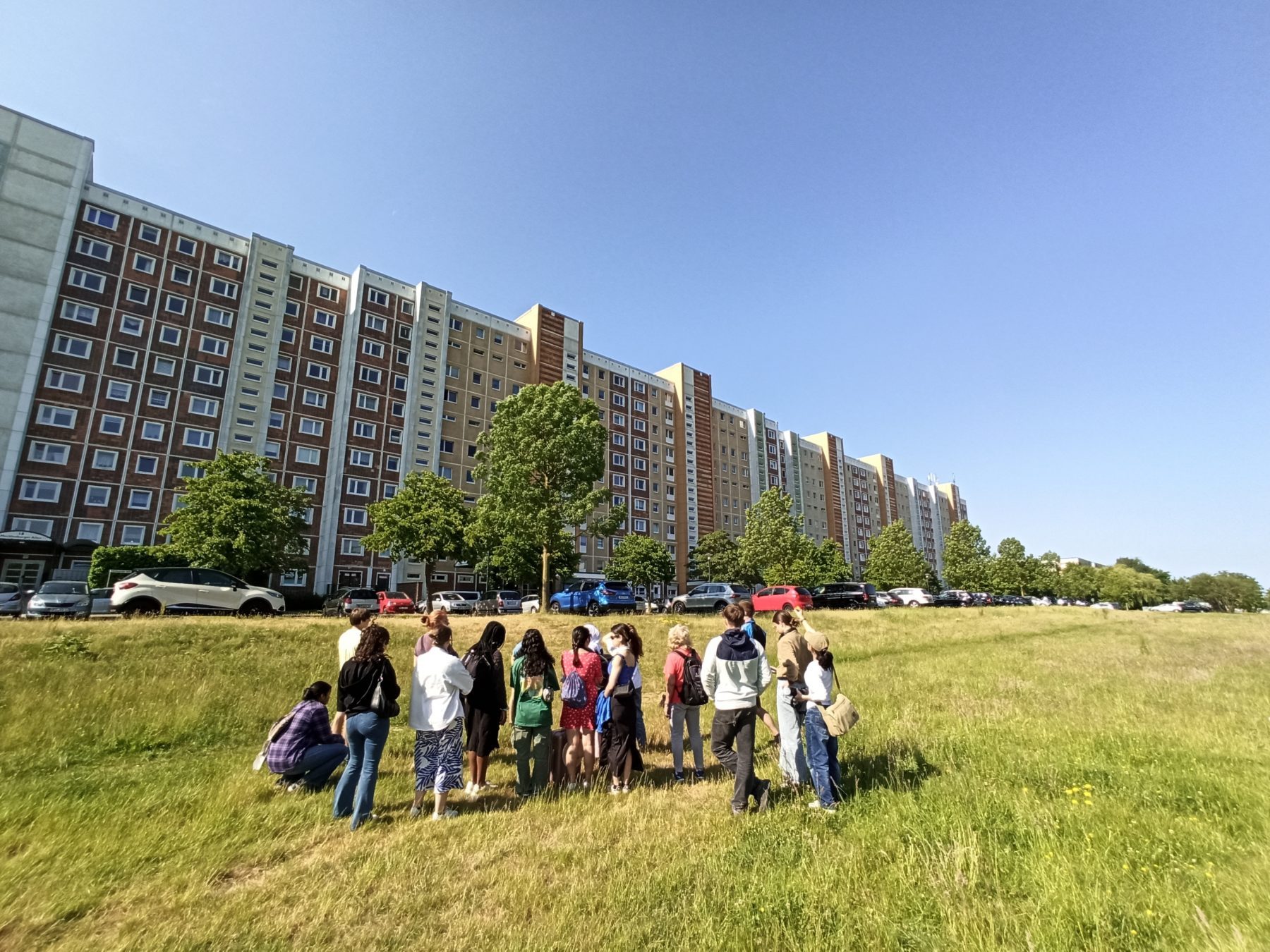
Summer camp in Rostock
08.09. – 18.09.2024
The summer camp is organised in cooperation with the “Lichtenhagen in Memory” documentation centre. The focus will be on dealing with the racist pogrom in Rostock-Lichtenhagen in 1992 in the form of archive work and thematic workshops. The Rostock-Lichtenhagen summer camp will take place for the first time in 2024.
You will deal thematically with the historical contextualisation of the racist pogrom, the perspectives, actions and demands of those affected as well as the history of reappraisal, remembrance and racist continuities. On the one hand, the analysis takes place in archive work. This includes cataloguing, sorting, recording and making newspaper articles, flyers, posters etc. usable. On the other hand, you will approach the topic in thematic and creative workshops. Here you will deal with both the history of the attack and the references to the present. You will also work with the local participatory radio station in Rostock to make the experience accessible to the public in the form of a radio programme or podcast.
Supported by the Pomeranian Foundation for Historical Education
A cooperation event with the Bundesarbeitsgemeinschaft Kirche und Rechtsextremismus (BAG K+R) funded by the Federal Ministry for Family Affairs, Senior Citizens, Women and Youth as part of the federal programme “Demokratie leben!”.
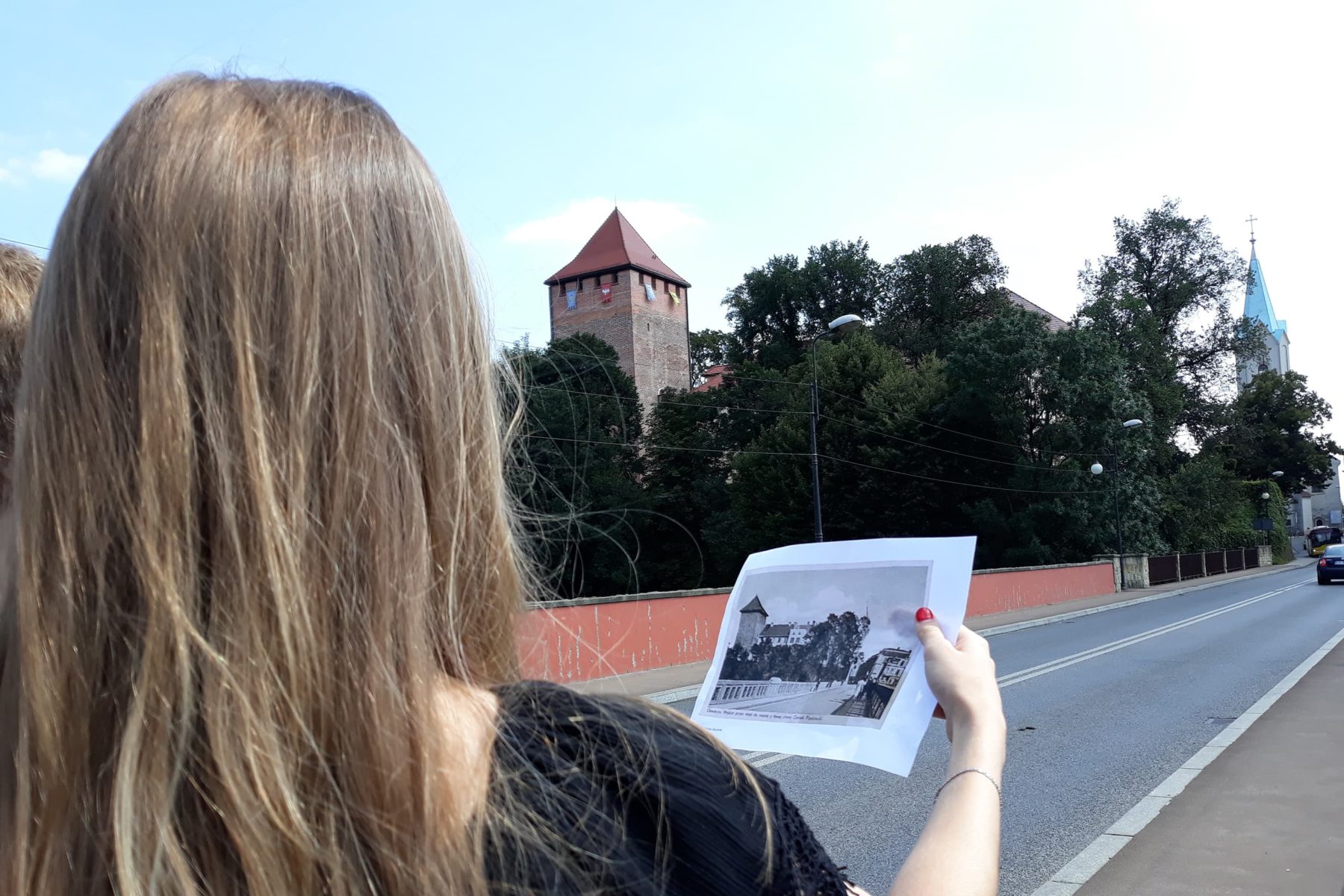
Searching for traces and uncovering forgotten stories
10.08-20.08.2024 (International Summer Camp at the International Youth Meeting Centre in Oświęcim/ Auschwitz)
Oświęcim is a small city in the south of Poland. It is known throughout the world under its German name, Auschwitz, as a symbol of the Holocaust. Not many know that the town has a history spanning 800 years. 8,000 Jews lived in Oświęcim, the Jewish name of the town with a total population of 14,000 before World War II. Jewish life, culture and numerous synagogues shaped life in this town for over 400 years.
All of this changed when Oświęcim was occupied in 1939 and the concentration camp of Auschwitz and the extermination camp Auschwitz-Birkenau were set up in 1940. During Auschwitz’s existence, almost 50 subcamps were created and in the vicinity of Oświęcim, in what was known as the Interessengebiet, there were eight agricultural subcamps and a complex of camps including the concentration camp KL Auschwitz III – Monowitz around the factory site of IG Farben.
In this international summer camp, you will learn about the history of the Auschwitz concentration and extermination camp and work with other participants and local actors to create an information folder in English. The information folder will provide background information about the Auschwitz camp complex and cover the former subcamps that are not part of the Auschwitz-Birkenau State Museum today. However, there are still remnants of the former camps and places of remembrance at these sites, which you will explore during the summer camp and document for the information folder, so that one can also seek out these places on their own.
Furthermore, hands-on work is also in the programme. At the Jewish cemetery in Oświęcim, you will take part in maintenance and upkeep work, such as clearing weeds and undergrowth and cleaning gravestones. Your work at the Jewish cemetery is an active contribution to remembrance. With our commitment, we remember the people who rest in the cemeteries and those who can no longer look after the graves of their relatives because they were expelled or murdered by the National Socialists.
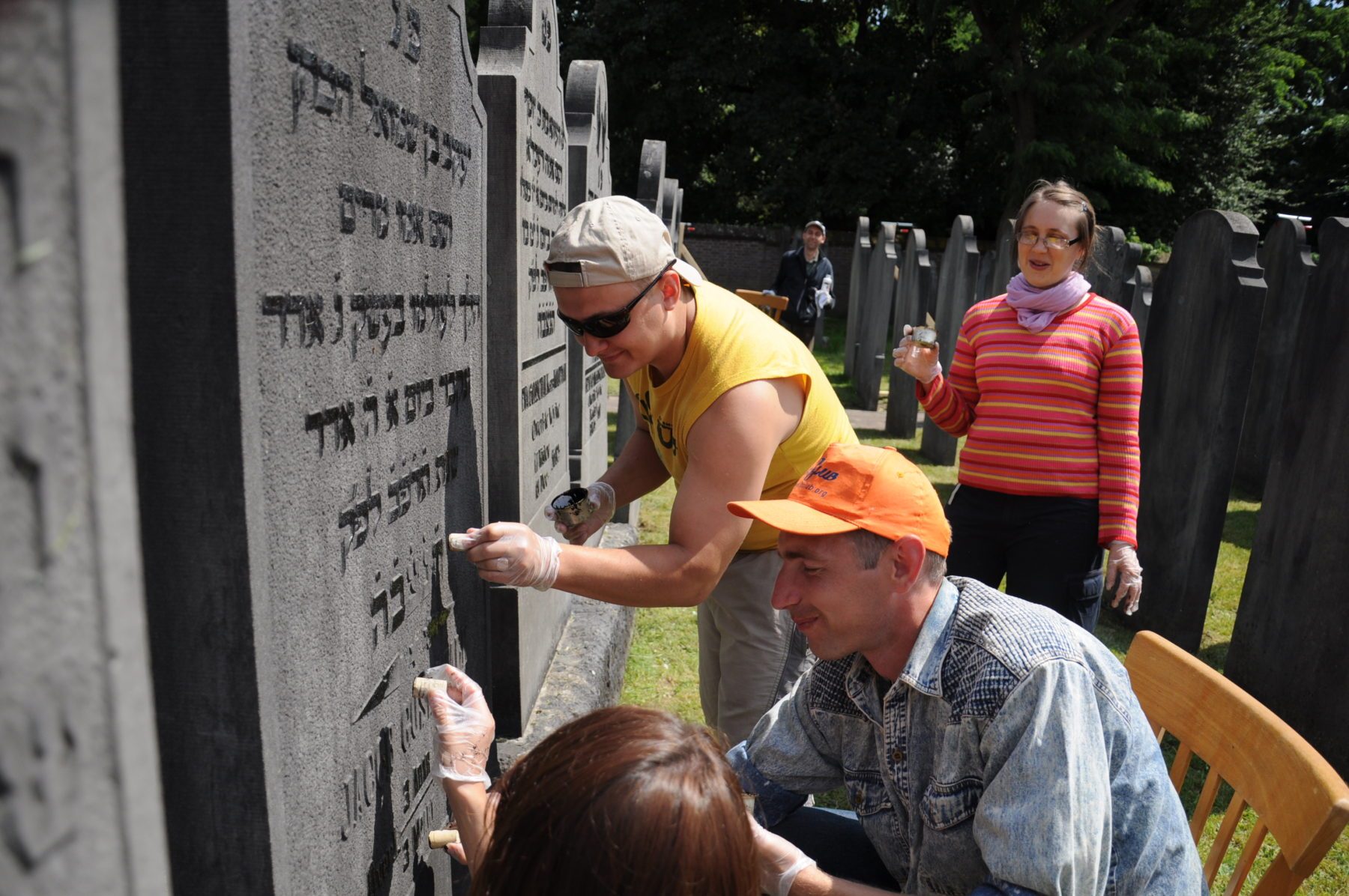
Summer camp in Deventer
01.08. – 10.08.2024 (from the age of 18, international)
The summer camp in Deventer in the Netherlands is organized by Aktion Sühnezeichen Friedensdienste and the Etty Hillesum Centrum. Young people from different countries meet in Deventer and help to make the inscriptions on the gravestones in the Jewish cemetery visible again, learn about the life of Etty Hillesum and visit a memorial site.
The program of the international summer camp promises to be very varied! This is not least due to the exciting location of Deventer: You will have the opportunity to get to grips with the history of the local Jewish community and also learn about life in the community today. You will spend part of your time at the Jewish community’s cemetery and help to make the inscriptions on the gravestones legible again. You can take part in a discussion with contemporary witnesses and learn more about the culture of remembrance in the Netherlands.
At the Etty Hillesum Centrum you will learn about the life of Etty (Esther) Hillesum through her diaries. Etty Hillesum was the child of a Jewish family. She came to Deventer at the age of ten. As a young woman, she refused to go into hiding in the occupied Netherlands. She was murdered in Ausschwitz in November 1943. The centre preserves her memory and is also involved in educational work against current forms of exclusion and discrimination.
In workshops and on excursions, you will explore questions of diversity in Europe together: What do human rights and tolerance towards those who think differently mean in the Netherlands? What is it like in the participants’ countries? On an excursion to Amsterdam, you will visit the Anne Frank House and the Resistance Museum (Verzetsmuseum). Another day trip will take you to the Westerbork Memorial.
There will also be plenty of variety in your free time: bike tours, excursions in the surrounding area, cooking together, a campfire atmosphere and, of course, the ideas you bring with you. And last but not least: Deventer is a beautiful old city next to the river.
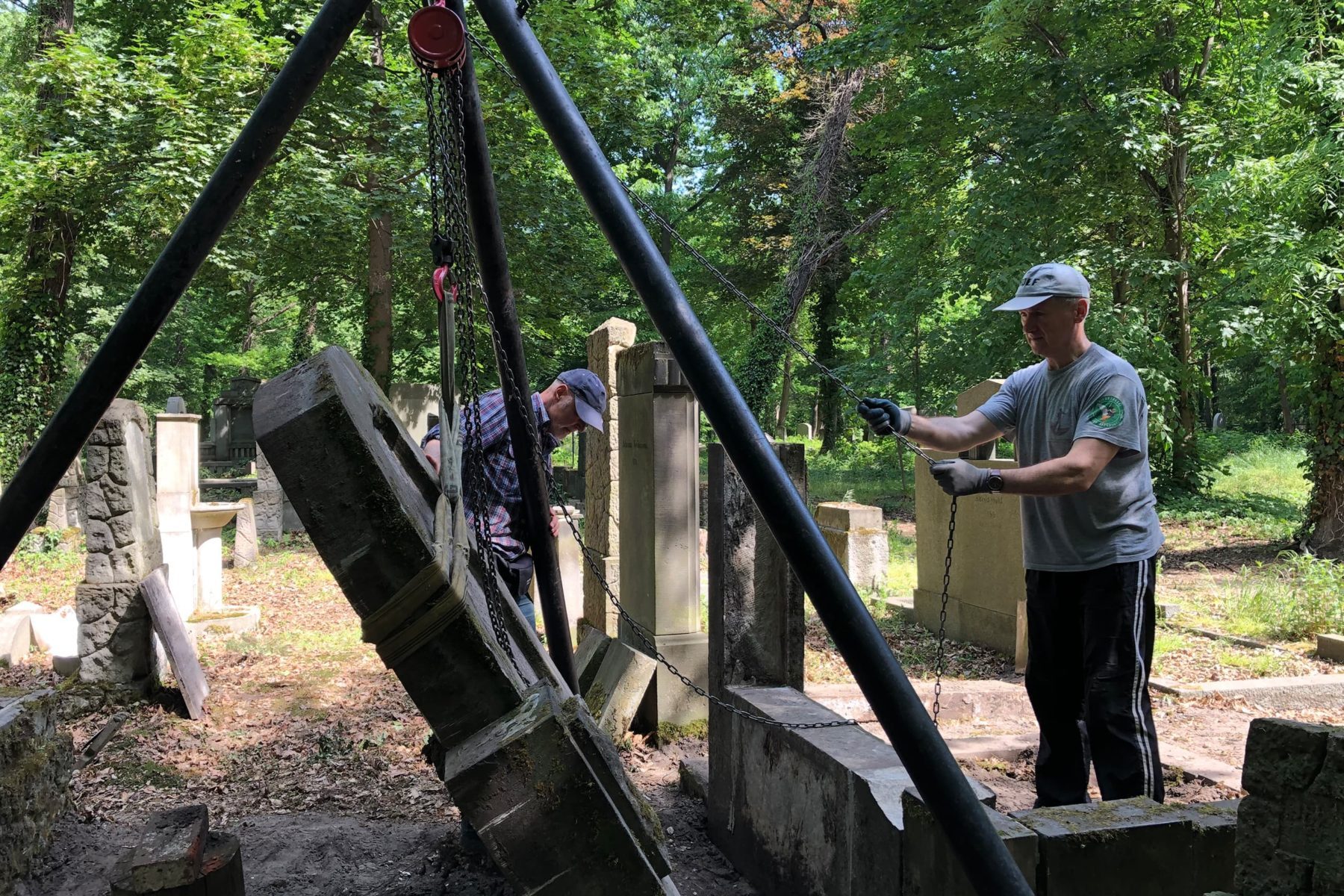
Summer Camp in Wrocław
15.06. – 23.06.2024 (intergenerativ, international)
The Jewish cemetery in Wrocław needs many helpers to restore it. After regular summer camps have taken place in recent years, the work will continue this year in an intergenerational group.
The summer camp is primarily aimed at people aged 40 and over, but is open to all interested adults. There is currently work to be done at the summer camp where younger people are explicitly invited to register. We look forward to active support from all interested parties, regardless of age.
The Jewish cemetery has been used as a burial ground by the Jewish community of Wrocław since 1902. The site of the summer camp is the old, largest part of the Jewish cemetery, where people were buried until the end of the Second World War. Important Jewish citizens of Wrocław who had rendered outstanding services to the city are buried there. The cemetery has not been maintained for a long time and has been partially vandalised. The northern half is completely overgrown. In some parts of the cemetery area, work has begun to clear away wood and branches from previous tree felling campaigns, clear and clean grave fields and paths and remove overgrown vegetation. The gravestones uncovered in the process were – as far as possible – erected and repaired. Field 24, where Jewish forced labourers and concentration camp prisoners were buried during the Second World War, is also to be cleared of the undergrowth and cleared of vegetation in order to make the graves visible. The work will be carried out under the expert guidance of the cemetery staff. The cemetery is still regularly used for burials today.
Wrocław presents itself as a lively and vibrant city with an unmistakable atmosphere, a “city of encounters”. The accompanying programme of the summer camp includes getting to know the history and present of the city, in particular the search for traces of Jewish life, and encounters with people, culture, religion and nature in a variety of ways. The participants have the opportunity to discover a very special, historic and modern city.
The project will take place twice this year. When registering, please indicate whether you would like to take part in the summer camp in June or August.
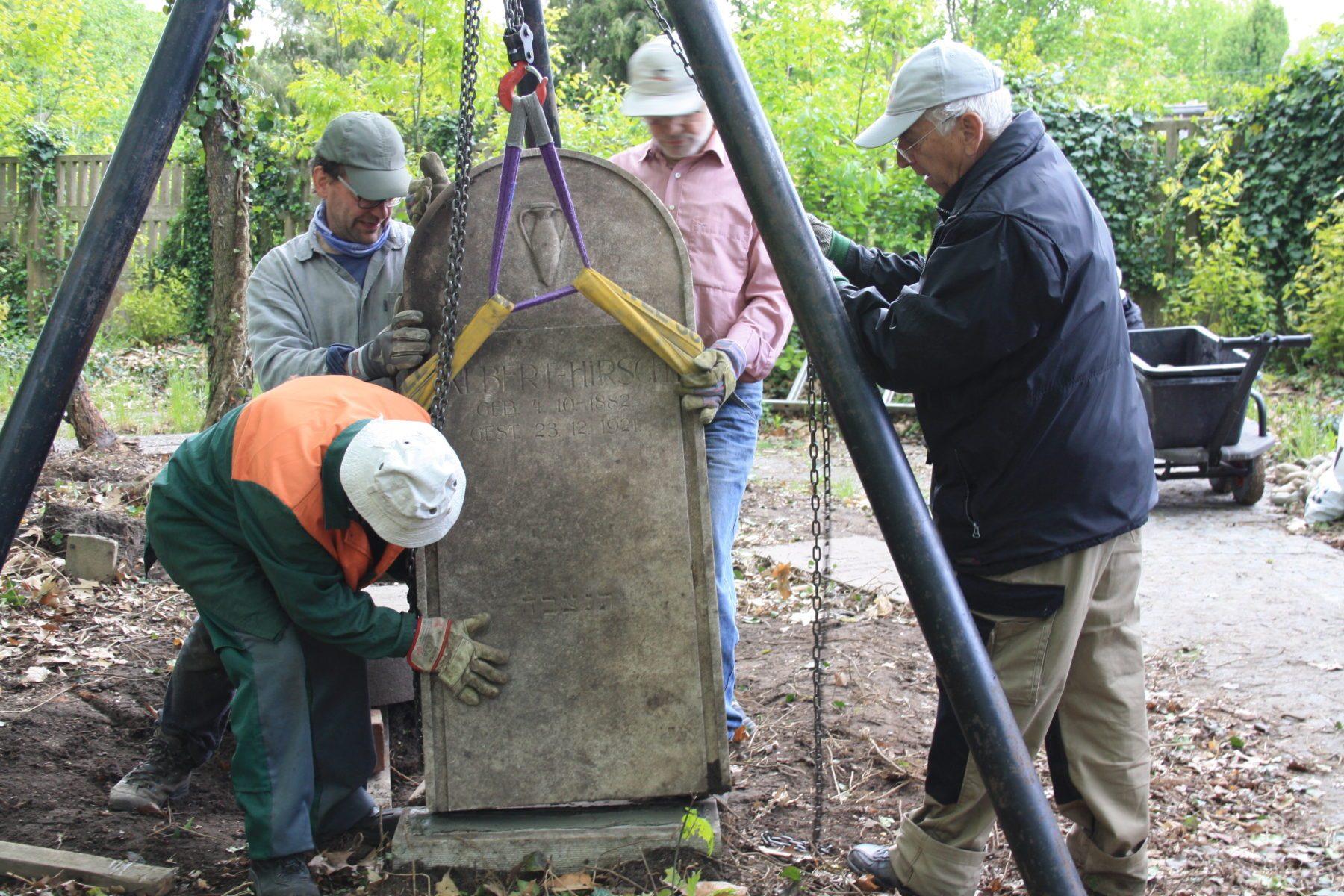
Summer Camp in Wrocław
24.08. – 01.09.2024 (intergenerativ, international)
The Jewish cemetery in Wrocław needs many helpers to restore it. After regular summer camps have taken place in recent years, the work will continue this year in an intergenerational group.
The summer camp is primarily aimed at people aged 40 and over, but is open to all interested adults. There is currently work to be done at the summer camp where younger people are explicitly invited to register. We look forward to active support from all interested parties, regardless of age.
The Jewish cemetery has been used as a burial ground by the Jewish community of Wrocław since 1902. The site of the summer camp is the old, largest part of the Jewish cemetery, where people were buried until the end of the Second World War. Important Jewish citizens of Wrocław who had rendered outstanding services to the city are buried there. The cemetery has not been maintained for a long time and has been partially vandalised. The northern half is completely overgrown. In some parts of the cemetery area, work has begun to clear away wood and branches from previous tree felling campaigns, clear and clean grave fields and paths and remove overgrown vegetation. The gravestones uncovered in the process were – as far as possible – erected and repaired. Field 24, where Jewish forced labourers and concentration camp prisoners were buried during the Second World War, is also to be cleared of the undergrowth and cleared of vegetation in order to make the graves visible. The work will be carried out under the expert guidance of the cemetery staff. The cemetery is still regularly used for burials today.
Wrocław presents itself as a lively and vibrant city with an unmistakable atmosphere, a “city of encounters”. The accompanying programme of the summer camp includes getting to know the history and present of the city, in particular the search for traces of Jewish life, and encounters with people, culture, religion and nature in a variety of ways. The participants have the opportunity to discover a very special, historic and modern city.
The project will take place twice this year. When registering, please indicate whether you would like to take part in the summer camp in June or August.
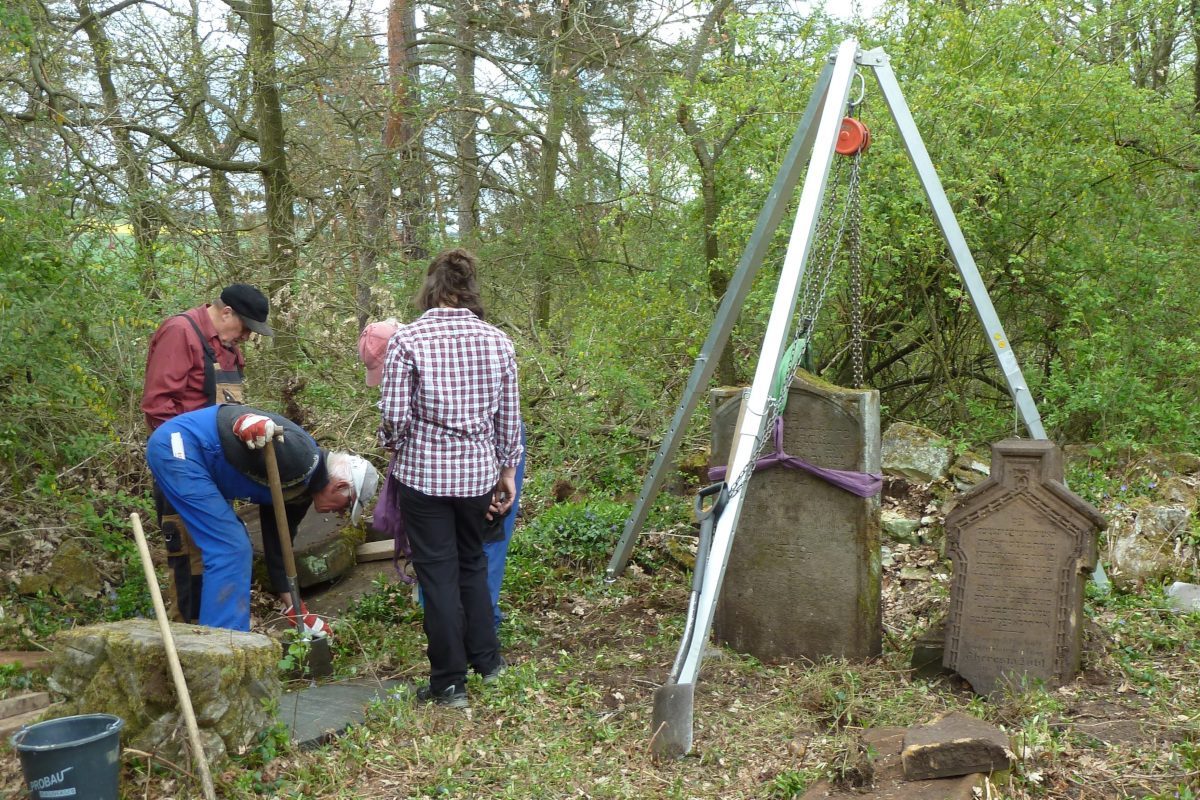
Summer camp in the Czech Republic
10.09. – 18.09.2024 (intergenerational, international)
This year we want to work in the Czech Republic again. We will be at a Jewish cemetery in Moravia, within a radius of approx. 100 km from Brno. We are still in the early stages of finding a suitable project. Unfortunately, local coordination and the selection of a suitable project can only take place in April. The project is expected to be finalized in May. We will then publish all the information on our website and inform the participants who have registered by then directly. Registration is now open. The participation fee will only be charged once the key dates for the summer camp have been finalized.
Registration and Costs
Registration for the summer camps is now open. Please complete the registration form in full. After your registration you will receive an e-mail from us to confirm your registration. Please also check your spam folder.
Your financial contribution to the summer camp
Participation fees staggered according to country of origin:
- Germany, Western, Northern and Southern Europe, North America, Israel: 130 euros reduced/ 160 euros without reduction.
- Baltic States, Greece, Poland, Slovakia, Slovenia, Czech Republic, Turkey, Hungary, Central and South America: 80 euros reduced/ 100 euros without reduction.
- Russia, Belarus, Ukraine, other Eastern and South-Eastern European countries: 60 euros reduced/ 80 euros without reduction.
Reductions apply for low earners and people without a fixed income. For some projects, the contributions may vary depending on the project type and project location. We will draw attention to this in the announcement for the summer camp.
If you cannot afford the participation fee – or not in full – please contact ASF. We will check your enquiry and try to make it possible for you to take part in a summer camp.
What other costs will you incur?
Individual arrival and departure
The summer camps begin and end on the specified dates. Travelling costs to the project location and expenses for obtaining visas are borne by the participants themselves. Where possible, we endeavour to include travel information and tips on how to travel to the summer camp location at a reasonable price with the project announcements. In any case, your own research is important!
Dispatch of visa invitations
If a visa is required for participation in a summer camp, ASF will send the visa invitations to the participants by post. The costs for postage and packaging vary: 3.50 euros for normal postage, 9.20 euros for international registered post or 11.30 euros for international express post.
Insurance policies
We take out accident and liability insurance for all participants.
For non-German participants, we also take out health insurance if they are attending a summer camp outside their home country. As proof of health insurance must be presented when applying for a visa, we recommend that you also take out personal private travel health insurance to avoid problems when entering the country.
All German participants must take out their own travel health insurance. Information is provided by the health insurance companies.
Private expenses/pocket money
ASF bears the costs for practical and content-related work and leisure activities. Please remember to bring enough pocket money for private expenses.
Cancellation policy
If you have to cancel your participation for unforeseen reasons, please inform us as soon as possible. If we receive your cancellation up to 5 weeks before the start of the camp, ASF will refund 80% of the participation fee. In the event of a later cancellation, no refund will be made, as places can usually not be filled within such a short time and ASF will incur costs due to already booked accommodation etc.
FAQ
Whether it’s registration, visas, accommodation or catering: Here you will find answers to FAQs – frequently asked questions – about the summer camps.
Registration
Who can take part?
All people aged 18 and over from Germany and abroad. There are two summer camps per year for volunteers of the over-40 generation(s).
Can I also register for two summer camps?
Yes, also for others. But unfortunately we cannot grant a discount.
Can I also register other people for the summer camp?
We would be delighted if you told your friends, family and acquaintances about the summer camps. However, enrolment is a personal decision. We therefore only accept individual registrations and not group registrations.
What happens if there are no more free places in my favourite projects?
In this case, you have the option of being placed on the waiting list. If there are still places available, we will inform you immediately. Alternatively, you can also choose other summer camps.
Is there a deadline for registering for the summer camp?
Registration begins with the publication of the full programme. Registrations are also possible at short notice, provided there are still enough places available. This only does not apply if a visa is required for the country of travel, as it usually takes a few days for ASF to issue the invitation and for participants to apply for a visa.
What happens if I have to cancel my participation?
If you have to cancel your participation for unforeseen reasons, please inform us as soon as possible. If we receive your cancellation up to 5 weeks before the start of the camp, ASF will refund 80% of the participation fee. In the event of a later cancellation, no refund will be made, as places can usually not be filled within such a short time and ASF will incur costs due to already booked accommodation etc.
Your participation in the summer camp is of great importance. Please bear in mind that your cancellation may have an impact on the planning and implementation of the project, as well as on those who are counting on your support on site.
Things to know for the preparation
How good do my foreign language skills need to be?
English is the main language at most summer camps. Some work camps require a good knowledge of German. Summer camps are work and encounter projects! We ask you to pay attention to the camp languages stated in the programme and to complete your application in one of the camp languages.
How do I organise the journey to the summer camp location?
Participants are responsible for their own travel costs, including visas. You organise the arrival and departure individually: The teamers do not coordinate group trips, but provide information on when and where the group will meet for the first and last time. The team leaders can give tips on travelling to and from the event if necessary.
What should I bring to summer camp?
ASF covers most of the expenses on site. Nevertheless, participants must provide their own work clothes, work gloves, sturdy shoes, weatherproof clothing, regular medication, personal hygiene items, adequate sun protection and personal expenses on site. In addition to dictionaries, cooking recipes, musical instruments, songs, books, games and materials, you will need to discuss with the team leaders what you can and should bring with you for your leisure activities.
How does ASF support me in obtaining a visa?
If you need a Schengen visa for a summer camp in Germany, Poland or the Czech Republic, we ask you to send us information from your passport with your application. We need this information to create an invitation. ASF will send the invitation to the home address stated on the registration form. The invitation is accompanied by proof of travel health insurance (only applies to non-German participants).
The invitation takes 1-4 weeks depending on the destination. Unfortunately, we are unable to assist with visa applications for participation in the summer camps in Latvia.
Due to the current situation, we are unfortunately unable to assist participants from Russia with visa applications. Interested parties from Russia require a valid Schengen visa.
Please contact the embassy of the country where the summer camp is taking place with the invitation. We recommend that you make an appointment to apply for a visa at the embassy as soon as possible. The appointment should be about four weeks before the start of the summer camp.
ASF requests in the invitations that a visa be issued free of charge. If the embassy of the respective country does not comply with this request, ASF will unfortunately not be able to cover any costs incurred for issuing the visa. The same applies to expenses for travelling to the embassy or consulate, which must be borne by the participants themselves.
When will I receive more information?
At the latest 4 weeks before the start of the summer camp, you will receive a detailed info mail from the teamers with all the information you need for travelling and packing.
On site at the summer camp
What does the summer camp programme look like?
The summer camps involve four to six hours of practical work per day. The remaining time is used for workshops on historical and political topics and excursions in the surrounding area. There is also enough time for informal group dialogue and reflection. All local programme costs are covered by ASF.
What about insurance?
We take out accident and liability insurance for all participants. For non-German participants, we also take out health insurance if they are attending a summer camp outside their home country. As proof of health insurance must be presented when applying for a visa, we recommend that you also take out personal private travel health insurance to avoid problems when entering the country. All German participants must take out their own travel health insurance. Information is provided by the health insurance companies.
Where will I be accommodated?
Summer camp participants live in simple accommodation, which varies depending on the project country and location. Summer camp participants have already lived in hostels, student residences, monasteries and, rarely, small hotels. Fans of camping holidays also get their money’s worth in some places. You may need your own sleeping bag and sleeping mat. You can find more information about accommodation in the programme description.
What is on the menu?
First and foremost: home-cooked food, as most summer camps are self-catering. The participants plan the course of the programme as a group and jointly distribute necessary tasks such as shopping, washing up, tidying up and cooking.
Team
Who are my local contacts?
Summer camps are supervised by dedicated volunteers. The management teams, also known as teamers, take care of arrangements with the local project partners, maintain contact with the registered summer camp participants and the ASF office in Berlin and develop the programme for your respective project.
How can I contact the summer camp team leaders?
ASF will provide you with the contact details of the team leaders once your participation fee has been received.
How many people are still taking part in the summer camp?
Most summer camps involve 12-15 people. Information on the expected number of participants can be found in the respective project advert.

